Social Responsibility and Elements of Stakeholders
VerifiedAdded on 2022/07/04
|15
|5638
|83
AI Summary
Stakeholders are individuals or organizations who have a share in the business organization, and therefore they have the right to see how it is performed, because they seek to make a profit from it, and shared it with social, political, economic, environmental, or cultural concerns. Corporate social responsibility covers the economic, legal, ethical, and discretionary (philanthropic) expectations that society has of businesses at a particular point in time,” according to Carroll's four-part definition.
Contribute Materials
Your contribution can guide someone’s learning journey. Share your
documents today.
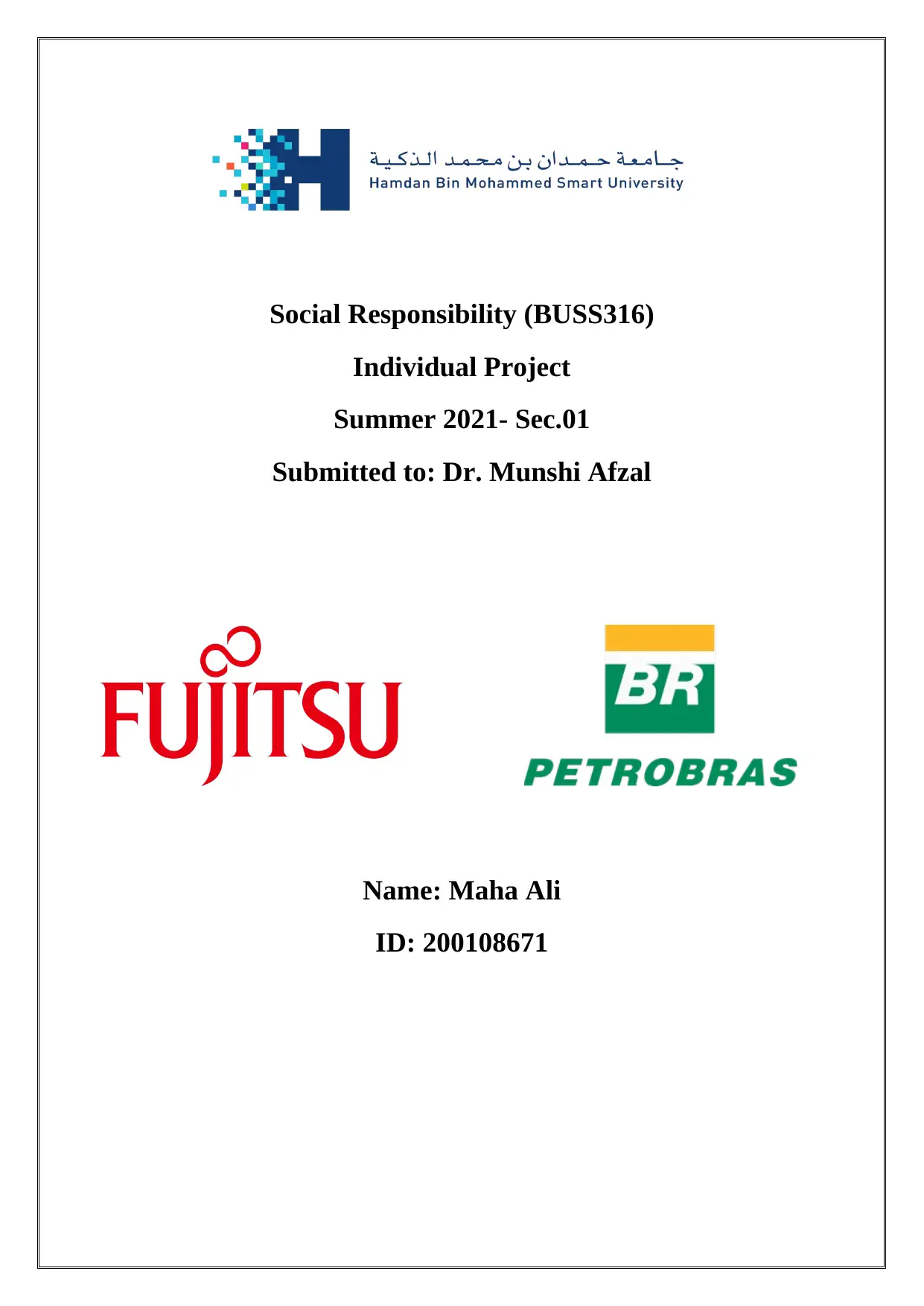
Social Responsibility (BUSS316)
Individual Project
Summer 2021- Sec.01
Submitted to: Dr. Munshi Afzal
Name: Maha Ali
ID: 200108671
Individual Project
Summer 2021- Sec.01
Submitted to: Dr. Munshi Afzal
Name: Maha Ali
ID: 200108671
Secure Best Marks with AI Grader
Need help grading? Try our AI Grader for instant feedback on your assignments.
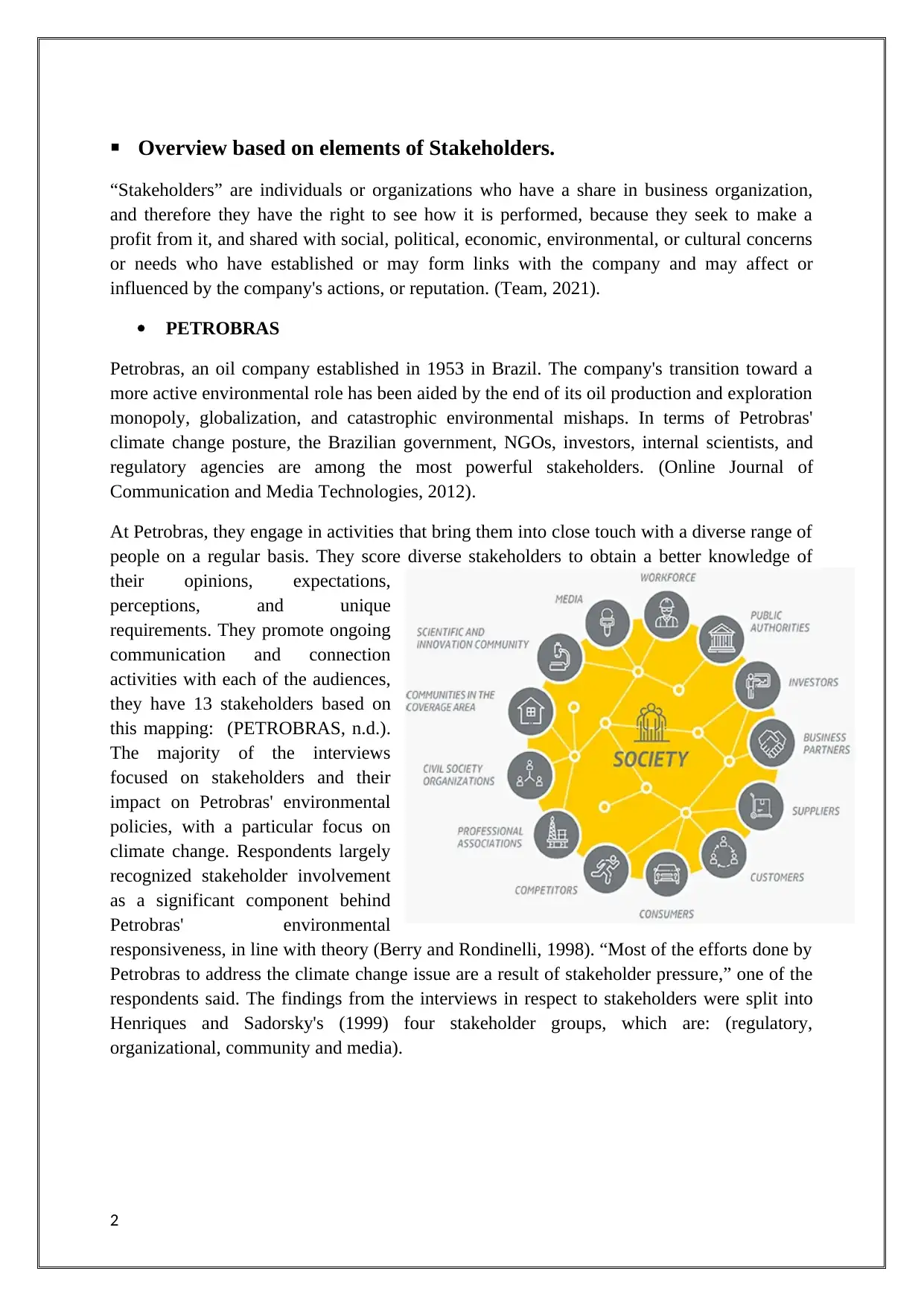
Overview based on elements of Stakeholders.
“Stakeholders” are individuals or organizations who have a share in business organization,
and therefore they have the right to see how it is performed, because they seek to make a
profit from it, and shared with social, political, economic, environmental, or cultural concerns
or needs who have established or may form links with the company and may affect or
influenced by the company's actions, or reputation. (Team, 2021).
PETROBRAS
Petrobras, an oil company established in 1953 in Brazil. The company's transition toward a
more active environmental role has been aided by the end of its oil production and exploration
monopoly, globalization, and catastrophic environmental mishaps. In terms of Petrobras'
climate change posture, the Brazilian government, NGOs, investors, internal scientists, and
regulatory agencies are among the most powerful stakeholders. (Online Journal of
Communication and Media Technologies, 2012).
At Petrobras, they engage in activities that bring them into close touch with a diverse range of
people on a regular basis. They score diverse stakeholders to obtain a better knowledge of
their opinions, expectations,
perceptions, and unique
requirements. They promote ongoing
communication and connection
activities with each of the audiences,
they have 13 stakeholders based on
this mapping: (PETROBRAS, n.d.).
The majority of the interviews
focused on stakeholders and their
impact on Petrobras' environmental
policies, with a particular focus on
climate change. Respondents largely
recognized stakeholder involvement
as a significant component behind
Petrobras' environmental
responsiveness, in line with theory (Berry and Rondinelli, 1998). “Most of the efforts done by
Petrobras to address the climate change issue are a result of stakeholder pressure,” one of the
respondents said. The findings from the interviews in respect to stakeholders were split into
Henriques and Sadorsky's (1999) four stakeholder groups, which are: (regulatory,
organizational, community and media).
2
“Stakeholders” are individuals or organizations who have a share in business organization,
and therefore they have the right to see how it is performed, because they seek to make a
profit from it, and shared with social, political, economic, environmental, or cultural concerns
or needs who have established or may form links with the company and may affect or
influenced by the company's actions, or reputation. (Team, 2021).
PETROBRAS
Petrobras, an oil company established in 1953 in Brazil. The company's transition toward a
more active environmental role has been aided by the end of its oil production and exploration
monopoly, globalization, and catastrophic environmental mishaps. In terms of Petrobras'
climate change posture, the Brazilian government, NGOs, investors, internal scientists, and
regulatory agencies are among the most powerful stakeholders. (Online Journal of
Communication and Media Technologies, 2012).
At Petrobras, they engage in activities that bring them into close touch with a diverse range of
people on a regular basis. They score diverse stakeholders to obtain a better knowledge of
their opinions, expectations,
perceptions, and unique
requirements. They promote ongoing
communication and connection
activities with each of the audiences,
they have 13 stakeholders based on
this mapping: (PETROBRAS, n.d.).
The majority of the interviews
focused on stakeholders and their
impact on Petrobras' environmental
policies, with a particular focus on
climate change. Respondents largely
recognized stakeholder involvement
as a significant component behind
Petrobras' environmental
responsiveness, in line with theory (Berry and Rondinelli, 1998). “Most of the efforts done by
Petrobras to address the climate change issue are a result of stakeholder pressure,” one of the
respondents said. The findings from the interviews in respect to stakeholders were split into
Henriques and Sadorsky's (1999) four stakeholder groups, which are: (regulatory,
organizational, community and media).
2
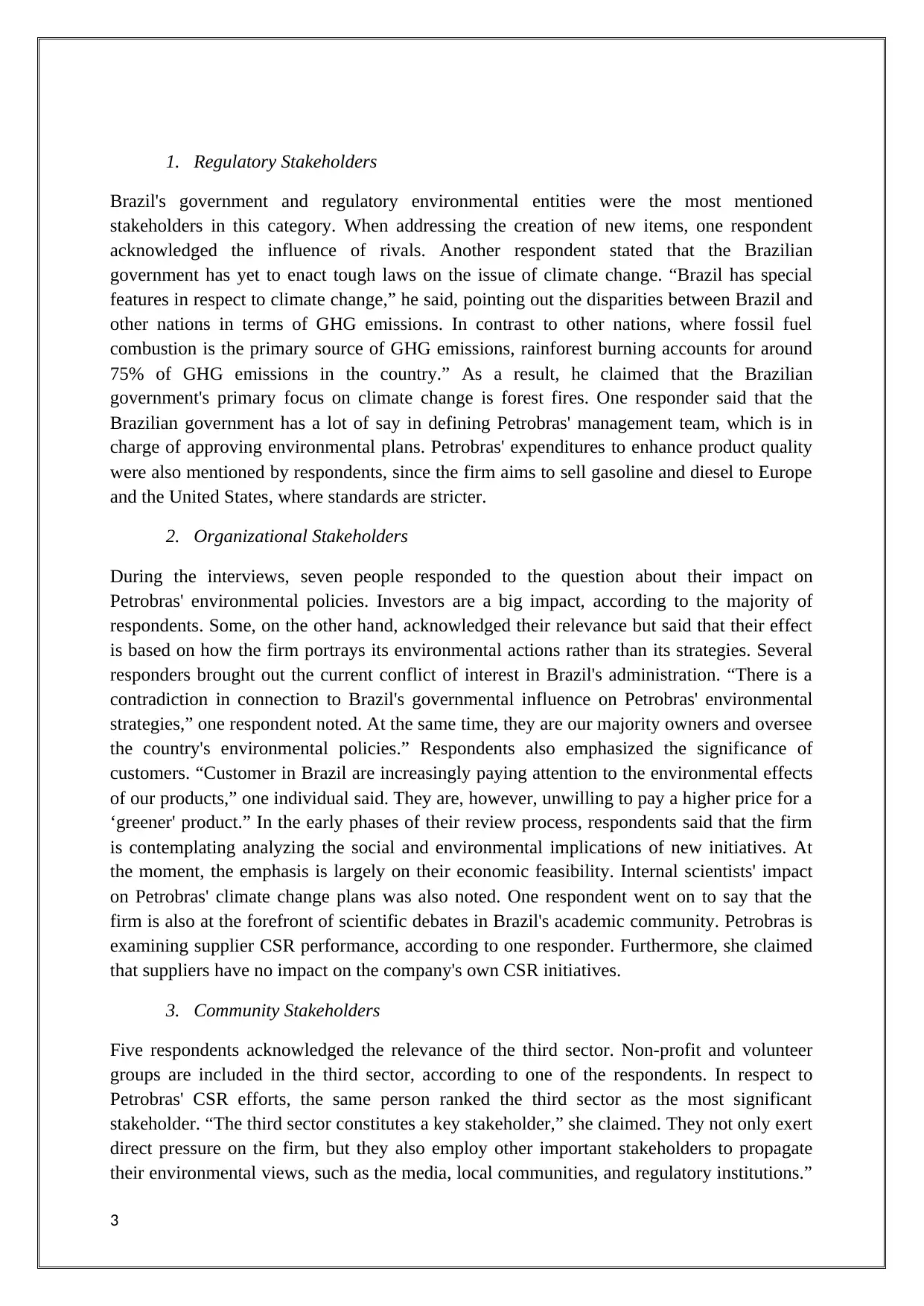
1. Regulatory Stakeholders
Brazil's government and regulatory environmental entities were the most mentioned
stakeholders in this category. When addressing the creation of new items, one respondent
acknowledged the influence of rivals. Another respondent stated that the Brazilian
government has yet to enact tough laws on the issue of climate change. “Brazil has special
features in respect to climate change,” he said, pointing out the disparities between Brazil and
other nations in terms of GHG emissions. In contrast to other nations, where fossil fuel
combustion is the primary source of GHG emissions, rainforest burning accounts for around
75% of GHG emissions in the country.” As a result, he claimed that the Brazilian
government's primary focus on climate change is forest fires. One responder said that the
Brazilian government has a lot of say in defining Petrobras' management team, which is in
charge of approving environmental plans. Petrobras' expenditures to enhance product quality
were also mentioned by respondents, since the firm aims to sell gasoline and diesel to Europe
and the United States, where standards are stricter.
2. Organizational Stakeholders
During the interviews, seven people responded to the question about their impact on
Petrobras' environmental policies. Investors are a big impact, according to the majority of
respondents. Some, on the other hand, acknowledged their relevance but said that their effect
is based on how the firm portrays its environmental actions rather than its strategies. Several
responders brought out the current conflict of interest in Brazil's administration. “There is a
contradiction in connection to Brazil's governmental influence on Petrobras' environmental
strategies,” one respondent noted. At the same time, they are our majority owners and oversee
the country's environmental policies.” Respondents also emphasized the significance of
customers. “Customer in Brazil are increasingly paying attention to the environmental effects
of our products,” one individual said. They are, however, unwilling to pay a higher price for a
‘greener' product.” In the early phases of their review process, respondents said that the firm
is contemplating analyzing the social and environmental implications of new initiatives. At
the moment, the emphasis is largely on their economic feasibility. Internal scientists' impact
on Petrobras' climate change plans was also noted. One respondent went on to say that the
firm is also at the forefront of scientific debates in Brazil's academic community. Petrobras is
examining supplier CSR performance, according to one responder. Furthermore, she claimed
that suppliers have no impact on the company's own CSR initiatives.
3. Community Stakeholders
Five respondents acknowledged the relevance of the third sector. Non-profit and volunteer
groups are included in the third sector, according to one of the respondents. In respect to
Petrobras' CSR efforts, the same person ranked the third sector as the most significant
stakeholder. “The third sector constitutes a key stakeholder,” she claimed. They not only exert
direct pressure on the firm, but they also employ other important stakeholders to propagate
their environmental views, such as the media, local communities, and regulatory institutions.”
3
Brazil's government and regulatory environmental entities were the most mentioned
stakeholders in this category. When addressing the creation of new items, one respondent
acknowledged the influence of rivals. Another respondent stated that the Brazilian
government has yet to enact tough laws on the issue of climate change. “Brazil has special
features in respect to climate change,” he said, pointing out the disparities between Brazil and
other nations in terms of GHG emissions. In contrast to other nations, where fossil fuel
combustion is the primary source of GHG emissions, rainforest burning accounts for around
75% of GHG emissions in the country.” As a result, he claimed that the Brazilian
government's primary focus on climate change is forest fires. One responder said that the
Brazilian government has a lot of say in defining Petrobras' management team, which is in
charge of approving environmental plans. Petrobras' expenditures to enhance product quality
were also mentioned by respondents, since the firm aims to sell gasoline and diesel to Europe
and the United States, where standards are stricter.
2. Organizational Stakeholders
During the interviews, seven people responded to the question about their impact on
Petrobras' environmental policies. Investors are a big impact, according to the majority of
respondents. Some, on the other hand, acknowledged their relevance but said that their effect
is based on how the firm portrays its environmental actions rather than its strategies. Several
responders brought out the current conflict of interest in Brazil's administration. “There is a
contradiction in connection to Brazil's governmental influence on Petrobras' environmental
strategies,” one respondent noted. At the same time, they are our majority owners and oversee
the country's environmental policies.” Respondents also emphasized the significance of
customers. “Customer in Brazil are increasingly paying attention to the environmental effects
of our products,” one individual said. They are, however, unwilling to pay a higher price for a
‘greener' product.” In the early phases of their review process, respondents said that the firm
is contemplating analyzing the social and environmental implications of new initiatives. At
the moment, the emphasis is largely on their economic feasibility. Internal scientists' impact
on Petrobras' climate change plans was also noted. One respondent went on to say that the
firm is also at the forefront of scientific debates in Brazil's academic community. Petrobras is
examining supplier CSR performance, according to one responder. Furthermore, she claimed
that suppliers have no impact on the company's own CSR initiatives.
3. Community Stakeholders
Five respondents acknowledged the relevance of the third sector. Non-profit and volunteer
groups are included in the third sector, according to one of the respondents. In respect to
Petrobras' CSR efforts, the same person ranked the third sector as the most significant
stakeholder. “The third sector constitutes a key stakeholder,” she claimed. They not only exert
direct pressure on the firm, but they also employ other important stakeholders to propagate
their environmental views, such as the media, local communities, and regulatory institutions.”
3
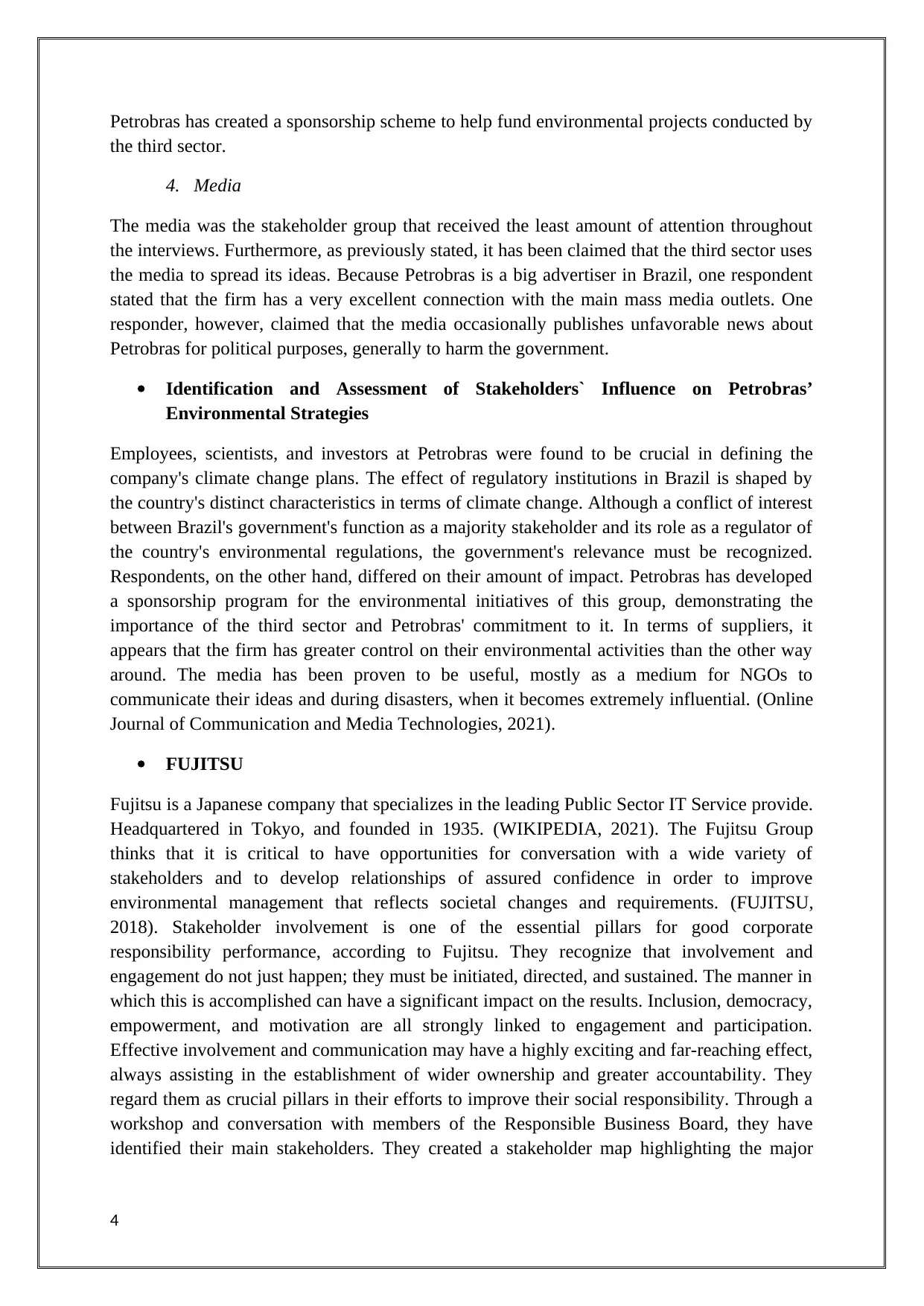
Petrobras has created a sponsorship scheme to help fund environmental projects conducted by
the third sector.
4. Media
The media was the stakeholder group that received the least amount of attention throughout
the interviews. Furthermore, as previously stated, it has been claimed that the third sector uses
the media to spread its ideas. Because Petrobras is a big advertiser in Brazil, one respondent
stated that the firm has a very excellent connection with the main mass media outlets. One
responder, however, claimed that the media occasionally publishes unfavorable news about
Petrobras for political purposes, generally to harm the government.
Identification and Assessment of Stakeholders` Influence on Petrobras’
Environmental Strategies
Employees, scientists, and investors at Petrobras were found to be crucial in defining the
company's climate change plans. The effect of regulatory institutions in Brazil is shaped by
the country's distinct characteristics in terms of climate change. Although a conflict of interest
between Brazil's government's function as a majority stakeholder and its role as a regulator of
the country's environmental regulations, the government's relevance must be recognized.
Respondents, on the other hand, differed on their amount of impact. Petrobras has developed
a sponsorship program for the environmental initiatives of this group, demonstrating the
importance of the third sector and Petrobras' commitment to it. In terms of suppliers, it
appears that the firm has greater control on their environmental activities than the other way
around. The media has been proven to be useful, mostly as a medium for NGOs to
communicate their ideas and during disasters, when it becomes extremely influential. (Online
Journal of Communication and Media Technologies, 2021).
FUJITSU
Fujitsu is a Japanese company that specializes in the leading Public Sector IT Service provide.
Headquartered in Tokyo, and founded in 1935. (WIKIPEDIA, 2021). The Fujitsu Group
thinks that it is critical to have opportunities for conversation with a wide variety of
stakeholders and to develop relationships of assured confidence in order to improve
environmental management that reflects societal changes and requirements. (FUJITSU,
2018). Stakeholder involvement is one of the essential pillars for good corporate
responsibility performance, according to Fujitsu. They recognize that involvement and
engagement do not just happen; they must be initiated, directed, and sustained. The manner in
which this is accomplished can have a significant impact on the results. Inclusion, democracy,
empowerment, and motivation are all strongly linked to engagement and participation.
Effective involvement and communication may have a highly exciting and far-reaching effect,
always assisting in the establishment of wider ownership and greater accountability. They
regard them as crucial pillars in their efforts to improve their social responsibility. Through a
workshop and conversation with members of the Responsible Business Board, they have
identified their main stakeholders. They created a stakeholder map highlighting the major
4
the third sector.
4. Media
The media was the stakeholder group that received the least amount of attention throughout
the interviews. Furthermore, as previously stated, it has been claimed that the third sector uses
the media to spread its ideas. Because Petrobras is a big advertiser in Brazil, one respondent
stated that the firm has a very excellent connection with the main mass media outlets. One
responder, however, claimed that the media occasionally publishes unfavorable news about
Petrobras for political purposes, generally to harm the government.
Identification and Assessment of Stakeholders` Influence on Petrobras’
Environmental Strategies
Employees, scientists, and investors at Petrobras were found to be crucial in defining the
company's climate change plans. The effect of regulatory institutions in Brazil is shaped by
the country's distinct characteristics in terms of climate change. Although a conflict of interest
between Brazil's government's function as a majority stakeholder and its role as a regulator of
the country's environmental regulations, the government's relevance must be recognized.
Respondents, on the other hand, differed on their amount of impact. Petrobras has developed
a sponsorship program for the environmental initiatives of this group, demonstrating the
importance of the third sector and Petrobras' commitment to it. In terms of suppliers, it
appears that the firm has greater control on their environmental activities than the other way
around. The media has been proven to be useful, mostly as a medium for NGOs to
communicate their ideas and during disasters, when it becomes extremely influential. (Online
Journal of Communication and Media Technologies, 2021).
FUJITSU
Fujitsu is a Japanese company that specializes in the leading Public Sector IT Service provide.
Headquartered in Tokyo, and founded in 1935. (WIKIPEDIA, 2021). The Fujitsu Group
thinks that it is critical to have opportunities for conversation with a wide variety of
stakeholders and to develop relationships of assured confidence in order to improve
environmental management that reflects societal changes and requirements. (FUJITSU,
2018). Stakeholder involvement is one of the essential pillars for good corporate
responsibility performance, according to Fujitsu. They recognize that involvement and
engagement do not just happen; they must be initiated, directed, and sustained. The manner in
which this is accomplished can have a significant impact on the results. Inclusion, democracy,
empowerment, and motivation are all strongly linked to engagement and participation.
Effective involvement and communication may have a highly exciting and far-reaching effect,
always assisting in the establishment of wider ownership and greater accountability. They
regard them as crucial pillars in their efforts to improve their social responsibility. Through a
workshop and conversation with members of the Responsible Business Board, they have
identified their main stakeholders. They created a stakeholder map highlighting the major
4
Secure Best Marks with AI Grader
Need help grading? Try our AI Grader for instant feedback on your assignments.

stakeholder groups as well as the primary and secondary communication channels indicated
for each group.
1. Employees
Fujitsu's internal involvement is
significant since responsible
business practice is one of their
main strategy topics. The central
team collaborates with other
departments across the company to
promote responsible business
initiatives using a variety of media,
including corporate email, intranet
sites, and films. The subject is
covered in their CEO Road Shows
and Regional Management
Meetings, as well as in their new
engagement activity, ‘Keep Shaping
Our Tomorrow.' Every month, they
send out a Topic of the Month email
to all workers, highlighting related
activities, events, and campaigns.
Employees are encouraged to
participate in these events and conversations, and comments and suggestions are solicited on a
regular basis.
2. Customers
Fujitsu is dedicated to offering environmentally friendly goods and services, and actively
promotes the benefits of its solutions to consumers. As part of their ‘Voice of the Customer'
feedback and improvement process, they may address their environmental performance as
well as their overall responsible business performance.
3. Fujitsu Group
Fujitsu Group, as the parent business, determines the direction for all Fujitsu areas throughout
the world. Fujitsu has focused its local programs on five main goals established by the Group.
They update The Group on the status of all key performance metrics on a regular basis.
4. Suppliers
Fujitsu expects its suppliers to follow the company's Code of Ethics and Global Business
Standards. As part of their selection process, they also ask vendors to complete an onboarding
5
for each group.
1. Employees
Fujitsu's internal involvement is
significant since responsible
business practice is one of their
main strategy topics. The central
team collaborates with other
departments across the company to
promote responsible business
initiatives using a variety of media,
including corporate email, intranet
sites, and films. The subject is
covered in their CEO Road Shows
and Regional Management
Meetings, as well as in their new
engagement activity, ‘Keep Shaping
Our Tomorrow.' Every month, they
send out a Topic of the Month email
to all workers, highlighting related
activities, events, and campaigns.
Employees are encouraged to
participate in these events and conversations, and comments and suggestions are solicited on a
regular basis.
2. Customers
Fujitsu is dedicated to offering environmentally friendly goods and services, and actively
promotes the benefits of its solutions to consumers. As part of their ‘Voice of the Customer'
feedback and improvement process, they may address their environmental performance as
well as their overall responsible business performance.
3. Fujitsu Group
Fujitsu Group, as the parent business, determines the direction for all Fujitsu areas throughout
the world. Fujitsu has focused its local programs on five main goals established by the Group.
They update The Group on the status of all key performance metrics on a regular basis.
4. Suppliers
Fujitsu expects its suppliers to follow the company's Code of Ethics and Global Business
Standards. As part of their selection process, they also ask vendors to complete an onboarding
5
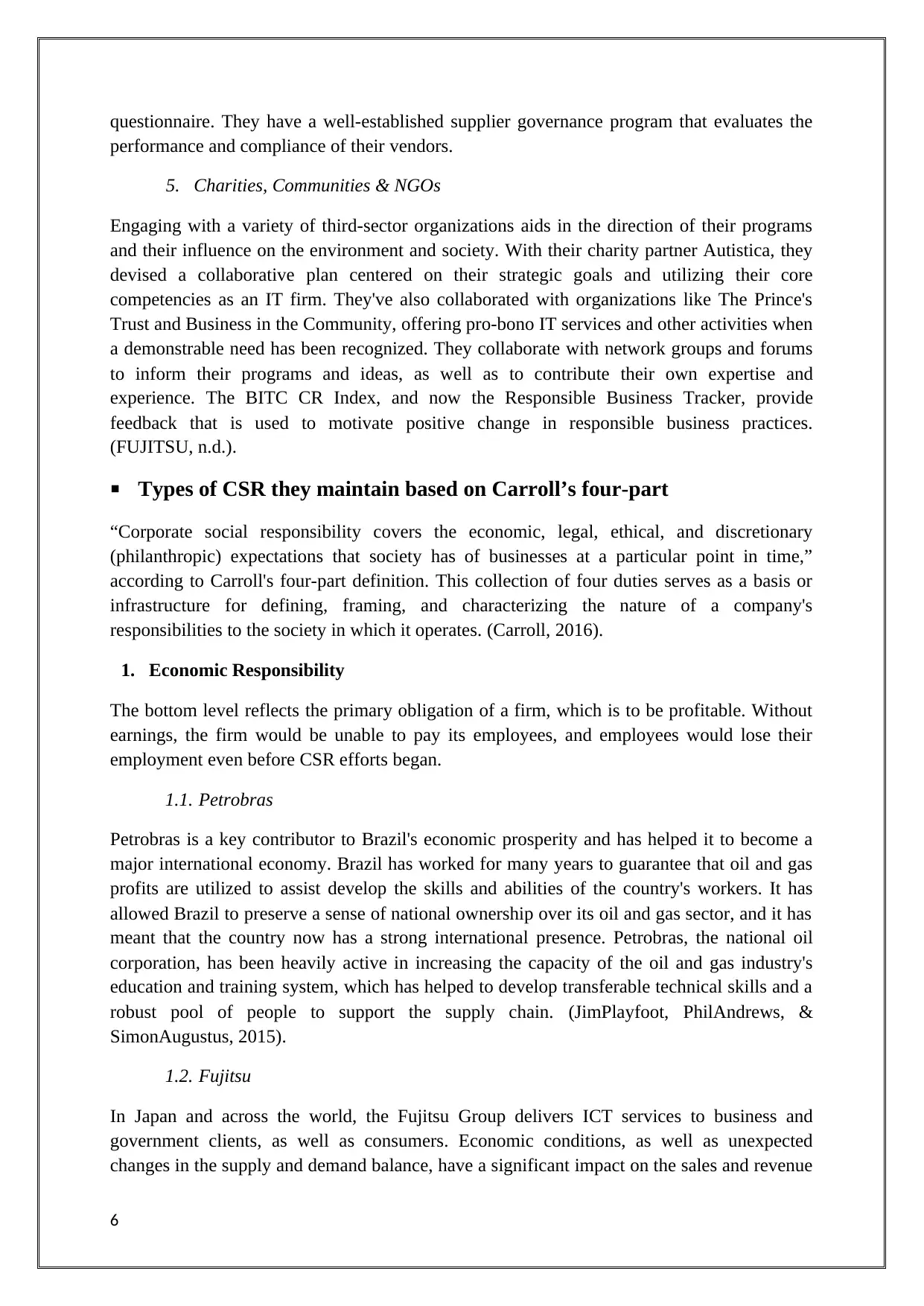
questionnaire. They have a well-established supplier governance program that evaluates the
performance and compliance of their vendors.
5. Charities, Communities & NGOs
Engaging with a variety of third-sector organizations aids in the direction of their programs
and their influence on the environment and society. With their charity partner Autistica, they
devised a collaborative plan centered on their strategic goals and utilizing their core
competencies as an IT firm. They've also collaborated with organizations like The Prince's
Trust and Business in the Community, offering pro-bono IT services and other activities when
a demonstrable need has been recognized. They collaborate with network groups and forums
to inform their programs and ideas, as well as to contribute their own expertise and
experience. The BITC CR Index, and now the Responsible Business Tracker, provide
feedback that is used to motivate positive change in responsible business practices.
(FUJITSU, n.d.).
Types of CSR they maintain based on Carroll’s four-part
“Corporate social responsibility covers the economic, legal, ethical, and discretionary
(philanthropic) expectations that society has of businesses at a particular point in time,”
according to Carroll's four-part definition. This collection of four duties serves as a basis or
infrastructure for defining, framing, and characterizing the nature of a company's
responsibilities to the society in which it operates. (Carroll, 2016).
1. Economic Responsibility
The bottom level reflects the primary obligation of a firm, which is to be profitable. Without
earnings, the firm would be unable to pay its employees, and employees would lose their
employment even before CSR efforts began.
1.1. Petrobras
Petrobras is a key contributor to Brazil's economic prosperity and has helped it to become a
major international economy. Brazil has worked for many years to guarantee that oil and gas
profits are utilized to assist develop the skills and abilities of the country's workers. It has
allowed Brazil to preserve a sense of national ownership over its oil and gas sector, and it has
meant that the country now has a strong international presence. Petrobras, the national oil
corporation, has been heavily active in increasing the capacity of the oil and gas industry's
education and training system, which has helped to develop transferable technical skills and a
robust pool of people to support the supply chain. (JimPlayfoot, PhilAndrews, &
SimonAugustus, 2015).
1.2. Fujitsu
In Japan and across the world, the Fujitsu Group delivers ICT services to business and
government clients, as well as consumers. Economic conditions, as well as unexpected
changes in the supply and demand balance, have a significant impact on the sales and revenue
6
performance and compliance of their vendors.
5. Charities, Communities & NGOs
Engaging with a variety of third-sector organizations aids in the direction of their programs
and their influence on the environment and society. With their charity partner Autistica, they
devised a collaborative plan centered on their strategic goals and utilizing their core
competencies as an IT firm. They've also collaborated with organizations like The Prince's
Trust and Business in the Community, offering pro-bono IT services and other activities when
a demonstrable need has been recognized. They collaborate with network groups and forums
to inform their programs and ideas, as well as to contribute their own expertise and
experience. The BITC CR Index, and now the Responsible Business Tracker, provide
feedback that is used to motivate positive change in responsible business practices.
(FUJITSU, n.d.).
Types of CSR they maintain based on Carroll’s four-part
“Corporate social responsibility covers the economic, legal, ethical, and discretionary
(philanthropic) expectations that society has of businesses at a particular point in time,”
according to Carroll's four-part definition. This collection of four duties serves as a basis or
infrastructure for defining, framing, and characterizing the nature of a company's
responsibilities to the society in which it operates. (Carroll, 2016).
1. Economic Responsibility
The bottom level reflects the primary obligation of a firm, which is to be profitable. Without
earnings, the firm would be unable to pay its employees, and employees would lose their
employment even before CSR efforts began.
1.1. Petrobras
Petrobras is a key contributor to Brazil's economic prosperity and has helped it to become a
major international economy. Brazil has worked for many years to guarantee that oil and gas
profits are utilized to assist develop the skills and abilities of the country's workers. It has
allowed Brazil to preserve a sense of national ownership over its oil and gas sector, and it has
meant that the country now has a strong international presence. Petrobras, the national oil
corporation, has been heavily active in increasing the capacity of the oil and gas industry's
education and training system, which has helped to develop transferable technical skills and a
robust pool of people to support the supply chain. (JimPlayfoot, PhilAndrews, &
SimonAugustus, 2015).
1.2. Fujitsu
In Japan and across the world, the Fujitsu Group delivers ICT services to business and
government clients, as well as consumers. Economic conditions, as well as unexpected
changes in the supply and demand balance, have a significant impact on the sales and revenue
6
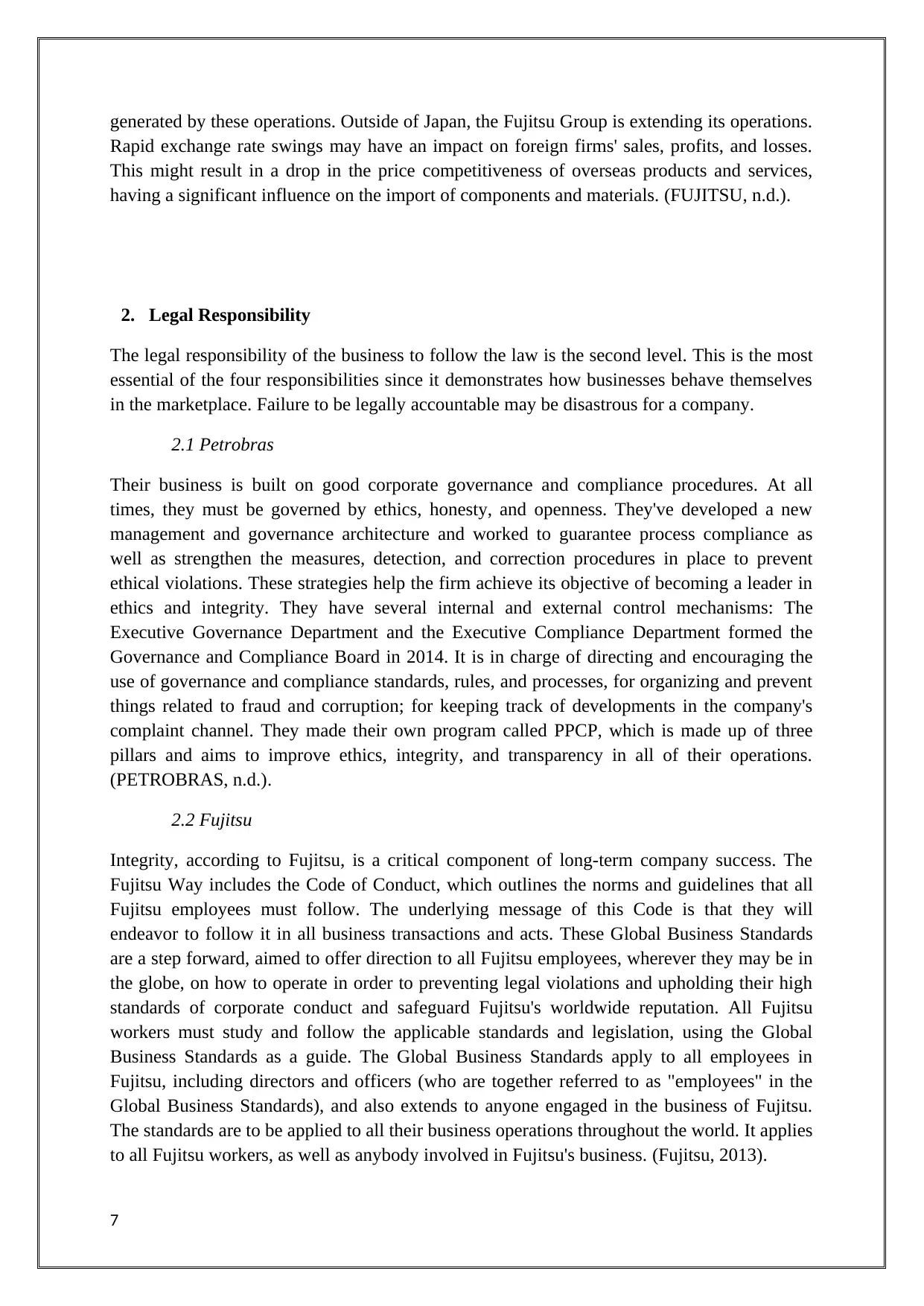
generated by these operations. Outside of Japan, the Fujitsu Group is extending its operations.
Rapid exchange rate swings may have an impact on foreign firms' sales, profits, and losses.
This might result in a drop in the price competitiveness of overseas products and services,
having a significant influence on the import of components and materials. (FUJITSU, n.d.).
2. Legal Responsibility
The legal responsibility of the business to follow the law is the second level. This is the most
essential of the four responsibilities since it demonstrates how businesses behave themselves
in the marketplace. Failure to be legally accountable may be disastrous for a company.
2.1 Petrobras
Their business is built on good corporate governance and compliance procedures. At all
times, they must be governed by ethics, honesty, and openness. They've developed a new
management and governance architecture and worked to guarantee process compliance as
well as strengthen the measures, detection, and correction procedures in place to prevent
ethical violations. These strategies help the firm achieve its objective of becoming a leader in
ethics and integrity. They have several internal and external control mechanisms: The
Executive Governance Department and the Executive Compliance Department formed the
Governance and Compliance Board in 2014. It is in charge of directing and encouraging the
use of governance and compliance standards, rules, and processes, for organizing and prevent
things related to fraud and corruption; for keeping track of developments in the company's
complaint channel. They made their own program called PPCP, which is made up of three
pillars and aims to improve ethics, integrity, and transparency in all of their operations.
(PETROBRAS, n.d.).
2.2 Fujitsu
Integrity, according to Fujitsu, is a critical component of long-term company success. The
Fujitsu Way includes the Code of Conduct, which outlines the norms and guidelines that all
Fujitsu employees must follow. The underlying message of this Code is that they will
endeavor to follow it in all business transactions and acts. These Global Business Standards
are a step forward, aimed to offer direction to all Fujitsu employees, wherever they may be in
the globe, on how to operate in order to preventing legal violations and upholding their high
standards of corporate conduct and safeguard Fujitsu's worldwide reputation. All Fujitsu
workers must study and follow the applicable standards and legislation, using the Global
Business Standards as a guide. The Global Business Standards apply to all employees in
Fujitsu, including directors and officers (who are together referred to as "employees" in the
Global Business Standards), and also extends to anyone engaged in the business of Fujitsu.
The standards are to be applied to all their business operations throughout the world. It applies
to all Fujitsu workers, as well as anybody involved in Fujitsu's business. (Fujitsu, 2013).
7
Rapid exchange rate swings may have an impact on foreign firms' sales, profits, and losses.
This might result in a drop in the price competitiveness of overseas products and services,
having a significant influence on the import of components and materials. (FUJITSU, n.d.).
2. Legal Responsibility
The legal responsibility of the business to follow the law is the second level. This is the most
essential of the four responsibilities since it demonstrates how businesses behave themselves
in the marketplace. Failure to be legally accountable may be disastrous for a company.
2.1 Petrobras
Their business is built on good corporate governance and compliance procedures. At all
times, they must be governed by ethics, honesty, and openness. They've developed a new
management and governance architecture and worked to guarantee process compliance as
well as strengthen the measures, detection, and correction procedures in place to prevent
ethical violations. These strategies help the firm achieve its objective of becoming a leader in
ethics and integrity. They have several internal and external control mechanisms: The
Executive Governance Department and the Executive Compliance Department formed the
Governance and Compliance Board in 2014. It is in charge of directing and encouraging the
use of governance and compliance standards, rules, and processes, for organizing and prevent
things related to fraud and corruption; for keeping track of developments in the company's
complaint channel. They made their own program called PPCP, which is made up of three
pillars and aims to improve ethics, integrity, and transparency in all of their operations.
(PETROBRAS, n.d.).
2.2 Fujitsu
Integrity, according to Fujitsu, is a critical component of long-term company success. The
Fujitsu Way includes the Code of Conduct, which outlines the norms and guidelines that all
Fujitsu employees must follow. The underlying message of this Code is that they will
endeavor to follow it in all business transactions and acts. These Global Business Standards
are a step forward, aimed to offer direction to all Fujitsu employees, wherever they may be in
the globe, on how to operate in order to preventing legal violations and upholding their high
standards of corporate conduct and safeguard Fujitsu's worldwide reputation. All Fujitsu
workers must study and follow the applicable standards and legislation, using the Global
Business Standards as a guide. The Global Business Standards apply to all employees in
Fujitsu, including directors and officers (who are together referred to as "employees" in the
Global Business Standards), and also extends to anyone engaged in the business of Fujitsu.
The standards are to be applied to all their business operations throughout the world. It applies
to all Fujitsu workers, as well as anybody involved in Fujitsu's business. (Fujitsu, 2013).
7
Paraphrase This Document
Need a fresh take? Get an instant paraphrase of this document with our AI Paraphraser
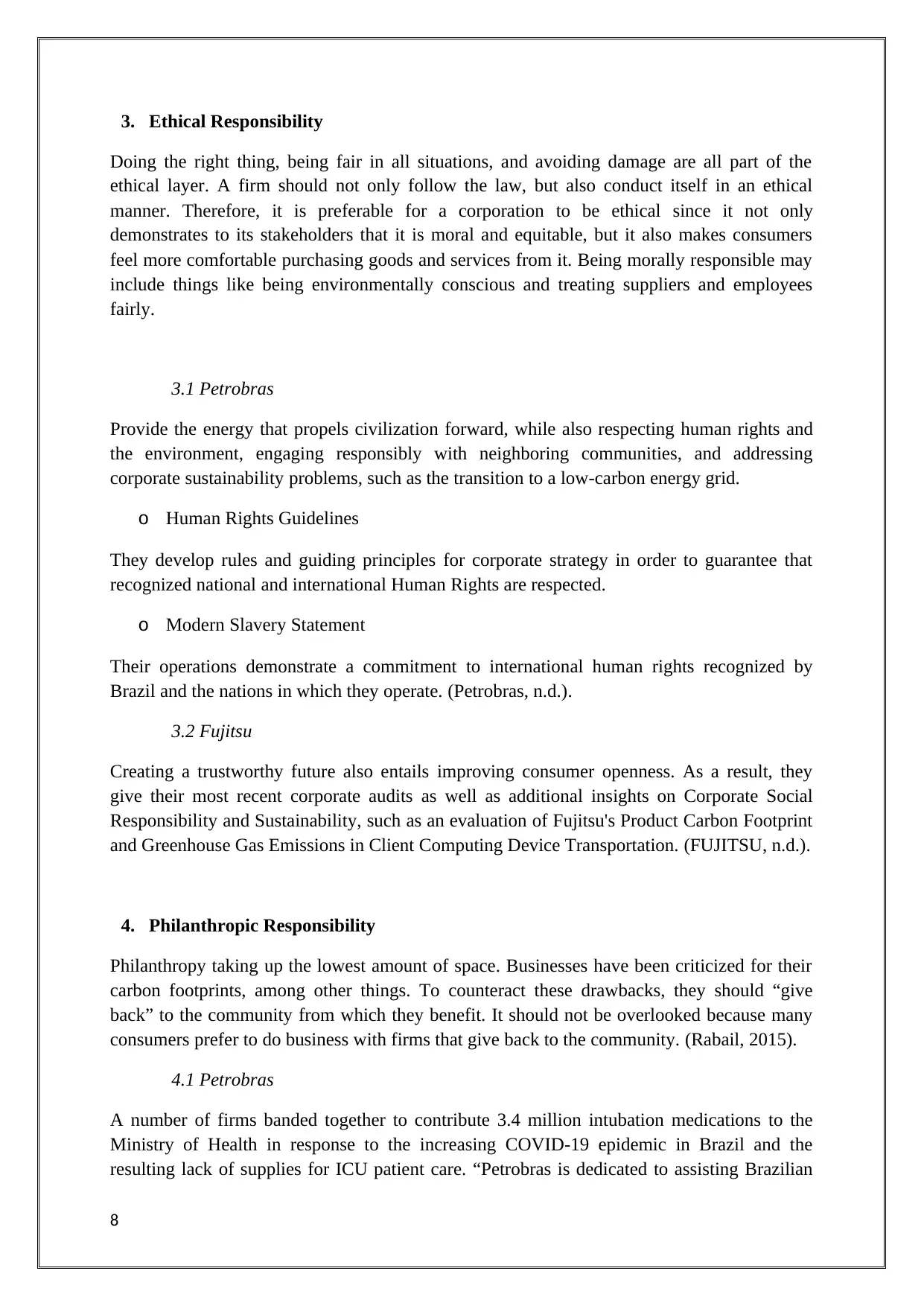
3. Ethical Responsibility
Doing the right thing, being fair in all situations, and avoiding damage are all part of the
ethical layer. A firm should not only follow the law, but also conduct itself in an ethical
manner. Therefore, it is preferable for a corporation to be ethical since it not only
demonstrates to its stakeholders that it is moral and equitable, but it also makes consumers
feel more comfortable purchasing goods and services from it. Being morally responsible may
include things like being environmentally conscious and treating suppliers and employees
fairly.
3.1 Petrobras
Provide the energy that propels civilization forward, while also respecting human rights and
the environment, engaging responsibly with neighboring communities, and addressing
corporate sustainability problems, such as the transition to a low-carbon energy grid.
o Human Rights Guidelines
They develop rules and guiding principles for corporate strategy in order to guarantee that
recognized national and international Human Rights are respected.
o Modern Slavery Statement
Their operations demonstrate a commitment to international human rights recognized by
Brazil and the nations in which they operate. (Petrobras, n.d.).
3.2 Fujitsu
Creating a trustworthy future also entails improving consumer openness. As a result, they
give their most recent corporate audits as well as additional insights on Corporate Social
Responsibility and Sustainability, such as an evaluation of Fujitsu's Product Carbon Footprint
and Greenhouse Gas Emissions in Client Computing Device Transportation. (FUJITSU, n.d.).
4. Philanthropic Responsibility
Philanthropy taking up the lowest amount of space. Businesses have been criticized for their
carbon footprints, among other things. To counteract these drawbacks, they should “give
back” to the community from which they benefit. It should not be overlooked because many
consumers prefer to do business with firms that give back to the community. (Rabail, 2015).
4.1 Petrobras
A number of firms banded together to contribute 3.4 million intubation medications to the
Ministry of Health in response to the increasing COVID-19 epidemic in Brazil and the
resulting lack of supplies for ICU patient care. “Petrobras is dedicated to assisting Brazilian
8
Doing the right thing, being fair in all situations, and avoiding damage are all part of the
ethical layer. A firm should not only follow the law, but also conduct itself in an ethical
manner. Therefore, it is preferable for a corporation to be ethical since it not only
demonstrates to its stakeholders that it is moral and equitable, but it also makes consumers
feel more comfortable purchasing goods and services from it. Being morally responsible may
include things like being environmentally conscious and treating suppliers and employees
fairly.
3.1 Petrobras
Provide the energy that propels civilization forward, while also respecting human rights and
the environment, engaging responsibly with neighboring communities, and addressing
corporate sustainability problems, such as the transition to a low-carbon energy grid.
o Human Rights Guidelines
They develop rules and guiding principles for corporate strategy in order to guarantee that
recognized national and international Human Rights are respected.
o Modern Slavery Statement
Their operations demonstrate a commitment to international human rights recognized by
Brazil and the nations in which they operate. (Petrobras, n.d.).
3.2 Fujitsu
Creating a trustworthy future also entails improving consumer openness. As a result, they
give their most recent corporate audits as well as additional insights on Corporate Social
Responsibility and Sustainability, such as an evaluation of Fujitsu's Product Carbon Footprint
and Greenhouse Gas Emissions in Client Computing Device Transportation. (FUJITSU, n.d.).
4. Philanthropic Responsibility
Philanthropy taking up the lowest amount of space. Businesses have been criticized for their
carbon footprints, among other things. To counteract these drawbacks, they should “give
back” to the community from which they benefit. It should not be overlooked because many
consumers prefer to do business with firms that give back to the community. (Rabail, 2015).
4.1 Petrobras
A number of firms banded together to contribute 3.4 million intubation medications to the
Ministry of Health in response to the increasing COVID-19 epidemic in Brazil and the
resulting lack of supplies for ICU patient care. “Petrobras is dedicated to assisting Brazilian
8
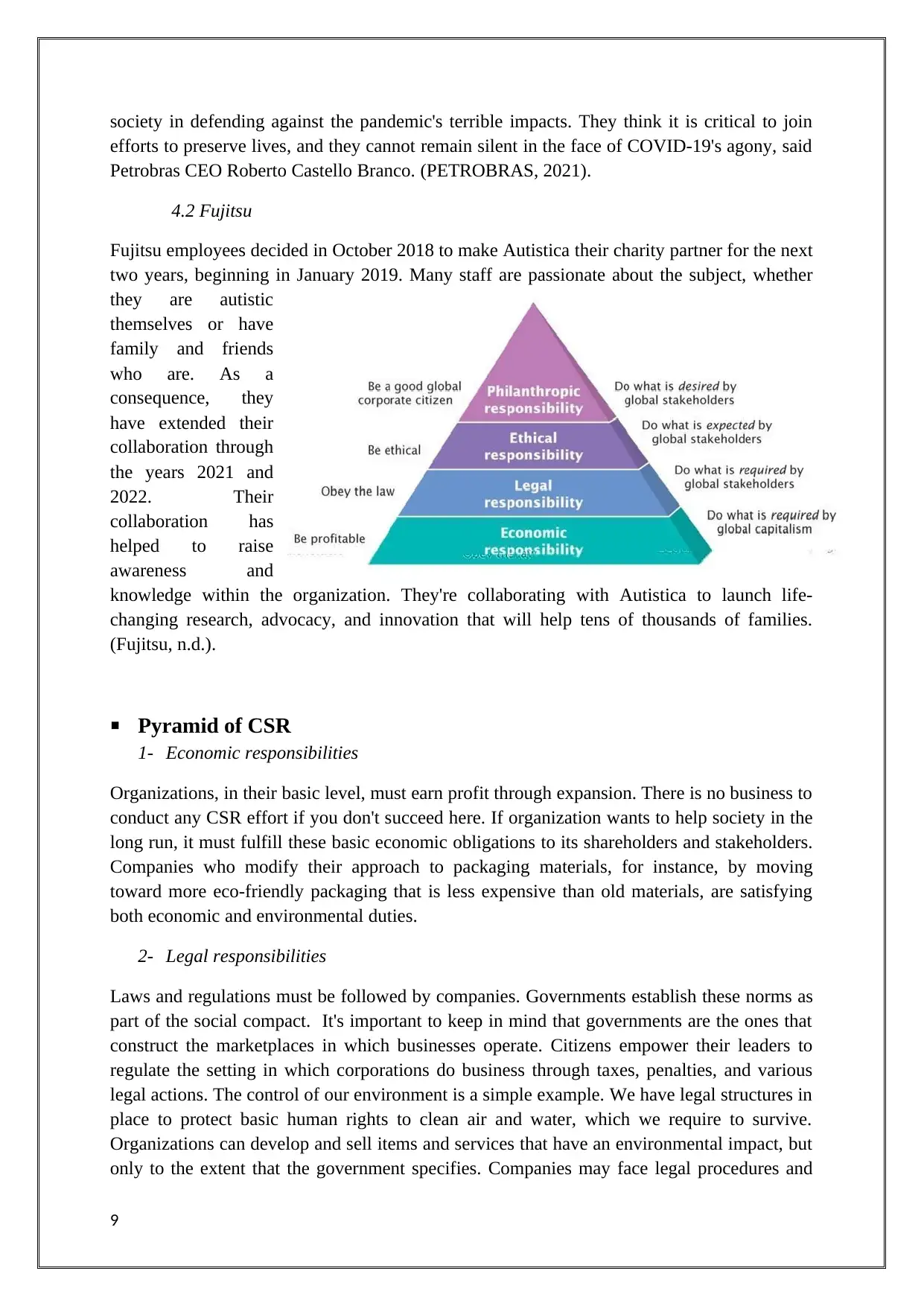
society in defending against the pandemic's terrible impacts. They think it is critical to join
efforts to preserve lives, and they cannot remain silent in the face of COVID-19's agony, said
Petrobras CEO Roberto Castello Branco. (PETROBRAS, 2021).
4.2 Fujitsu
Fujitsu employees decided in October 2018 to make Autistica their charity partner for the next
two years, beginning in January 2019. Many staff are passionate about the subject, whether
they are autistic
themselves or have
family and friends
who are. As a
consequence, they
have extended their
collaboration through
the years 2021 and
2022. Their
collaboration has
helped to raise
awareness and
knowledge within the organization. They're collaborating with Autistica to launch life-
changing research, advocacy, and innovation that will help tens of thousands of families.
(Fujitsu, n.d.).
Pyramid of CSR
1- Economic responsibilities
Organizations, in their basic level, must earn profit through expansion. There is no business to
conduct any CSR effort if you don't succeed here. If organization wants to help society in the
long run, it must fulfill these basic economic obligations to its shareholders and stakeholders.
Companies who modify their approach to packaging materials, for instance, by moving
toward more eco-friendly packaging that is less expensive than old materials, are satisfying
both economic and environmental duties.
2- Legal responsibilities
Laws and regulations must be followed by companies. Governments establish these norms as
part of the social compact. It's important to keep in mind that governments are the ones that
construct the marketplaces in which businesses operate. Citizens empower their leaders to
regulate the setting in which corporations do business through taxes, penalties, and various
legal actions. The control of our environment is a simple example. We have legal structures in
place to protect basic human rights to clean air and water, which we require to survive.
Organizations can develop and sell items and services that have an environmental impact, but
only to the extent that the government specifies. Companies may face legal procedures and
9
efforts to preserve lives, and they cannot remain silent in the face of COVID-19's agony, said
Petrobras CEO Roberto Castello Branco. (PETROBRAS, 2021).
4.2 Fujitsu
Fujitsu employees decided in October 2018 to make Autistica their charity partner for the next
two years, beginning in January 2019. Many staff are passionate about the subject, whether
they are autistic
themselves or have
family and friends
who are. As a
consequence, they
have extended their
collaboration through
the years 2021 and
2022. Their
collaboration has
helped to raise
awareness and
knowledge within the organization. They're collaborating with Autistica to launch life-
changing research, advocacy, and innovation that will help tens of thousands of families.
(Fujitsu, n.d.).
Pyramid of CSR
1- Economic responsibilities
Organizations, in their basic level, must earn profit through expansion. There is no business to
conduct any CSR effort if you don't succeed here. If organization wants to help society in the
long run, it must fulfill these basic economic obligations to its shareholders and stakeholders.
Companies who modify their approach to packaging materials, for instance, by moving
toward more eco-friendly packaging that is less expensive than old materials, are satisfying
both economic and environmental duties.
2- Legal responsibilities
Laws and regulations must be followed by companies. Governments establish these norms as
part of the social compact. It's important to keep in mind that governments are the ones that
construct the marketplaces in which businesses operate. Citizens empower their leaders to
regulate the setting in which corporations do business through taxes, penalties, and various
legal actions. The control of our environment is a simple example. We have legal structures in
place to protect basic human rights to clean air and water, which we require to survive.
Organizations can develop and sell items and services that have an environmental impact, but
only to the extent that the government specifies. Companies may face legal procedures and
9
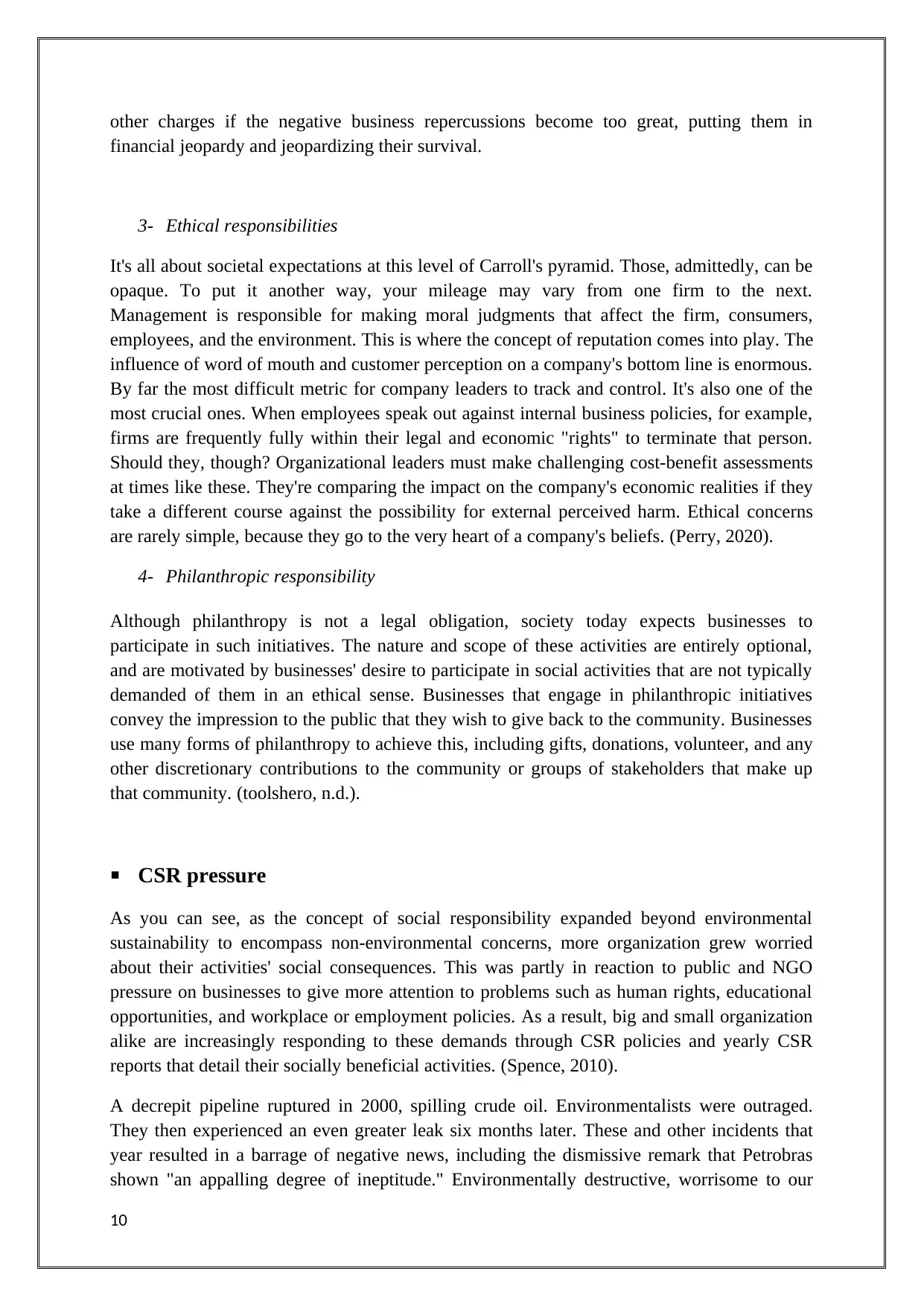
other charges if the negative business repercussions become too great, putting them in
financial jeopardy and jeopardizing their survival.
3- Ethical responsibilities
It's all about societal expectations at this level of Carroll's pyramid. Those, admittedly, can be
opaque. To put it another way, your mileage may vary from one firm to the next.
Management is responsible for making moral judgments that affect the firm, consumers,
employees, and the environment. This is where the concept of reputation comes into play. The
influence of word of mouth and customer perception on a company's bottom line is enormous.
By far the most difficult metric for company leaders to track and control. It's also one of the
most crucial ones. When employees speak out against internal business policies, for example,
firms are frequently fully within their legal and economic "rights" to terminate that person.
Should they, though? Organizational leaders must make challenging cost-benefit assessments
at times like these. They're comparing the impact on the company's economic realities if they
take a different course against the possibility for external perceived harm. Ethical concerns
are rarely simple, because they go to the very heart of a company's beliefs. (Perry, 2020).
4- Philanthropic responsibility
Although philanthropy is not a legal obligation, society today expects businesses to
participate in such initiatives. The nature and scope of these activities are entirely optional,
and are motivated by businesses' desire to participate in social activities that are not typically
demanded of them in an ethical sense. Businesses that engage in philanthropic initiatives
convey the impression to the public that they wish to give back to the community. Businesses
use many forms of philanthropy to achieve this, including gifts, donations, volunteer, and any
other discretionary contributions to the community or groups of stakeholders that make up
that community. (toolshero, n.d.).
CSR pressure
As you can see, as the concept of social responsibility expanded beyond environmental
sustainability to encompass non-environmental concerns, more organization grew worried
about their activities' social consequences. This was partly in reaction to public and NGO
pressure on businesses to give more attention to problems such as human rights, educational
opportunities, and workplace or employment policies. As a result, big and small organization
alike are increasingly responding to these demands through CSR policies and yearly CSR
reports that detail their socially beneficial activities. (Spence, 2010).
A decrepit pipeline ruptured in 2000, spilling crude oil. Environmentalists were outraged.
They then experienced an even greater leak six months later. These and other incidents that
year resulted in a barrage of negative news, including the dismissive remark that Petrobras
shown "an appalling degree of ineptitude." Environmentally destructive, worrisome to our
10
financial jeopardy and jeopardizing their survival.
3- Ethical responsibilities
It's all about societal expectations at this level of Carroll's pyramid. Those, admittedly, can be
opaque. To put it another way, your mileage may vary from one firm to the next.
Management is responsible for making moral judgments that affect the firm, consumers,
employees, and the environment. This is where the concept of reputation comes into play. The
influence of word of mouth and customer perception on a company's bottom line is enormous.
By far the most difficult metric for company leaders to track and control. It's also one of the
most crucial ones. When employees speak out against internal business policies, for example,
firms are frequently fully within their legal and economic "rights" to terminate that person.
Should they, though? Organizational leaders must make challenging cost-benefit assessments
at times like these. They're comparing the impact on the company's economic realities if they
take a different course against the possibility for external perceived harm. Ethical concerns
are rarely simple, because they go to the very heart of a company's beliefs. (Perry, 2020).
4- Philanthropic responsibility
Although philanthropy is not a legal obligation, society today expects businesses to
participate in such initiatives. The nature and scope of these activities are entirely optional,
and are motivated by businesses' desire to participate in social activities that are not typically
demanded of them in an ethical sense. Businesses that engage in philanthropic initiatives
convey the impression to the public that they wish to give back to the community. Businesses
use many forms of philanthropy to achieve this, including gifts, donations, volunteer, and any
other discretionary contributions to the community or groups of stakeholders that make up
that community. (toolshero, n.d.).
CSR pressure
As you can see, as the concept of social responsibility expanded beyond environmental
sustainability to encompass non-environmental concerns, more organization grew worried
about their activities' social consequences. This was partly in reaction to public and NGO
pressure on businesses to give more attention to problems such as human rights, educational
opportunities, and workplace or employment policies. As a result, big and small organization
alike are increasingly responding to these demands through CSR policies and yearly CSR
reports that detail their socially beneficial activities. (Spence, 2010).
A decrepit pipeline ruptured in 2000, spilling crude oil. Environmentalists were outraged.
They then experienced an even greater leak six months later. These and other incidents that
year resulted in a barrage of negative news, including the dismissive remark that Petrobras
shown "an appalling degree of ineptitude." Environmentally destructive, worrisome to our
10
Secure Best Marks with AI Grader
Need help grading? Try our AI Grader for instant feedback on your assignments.
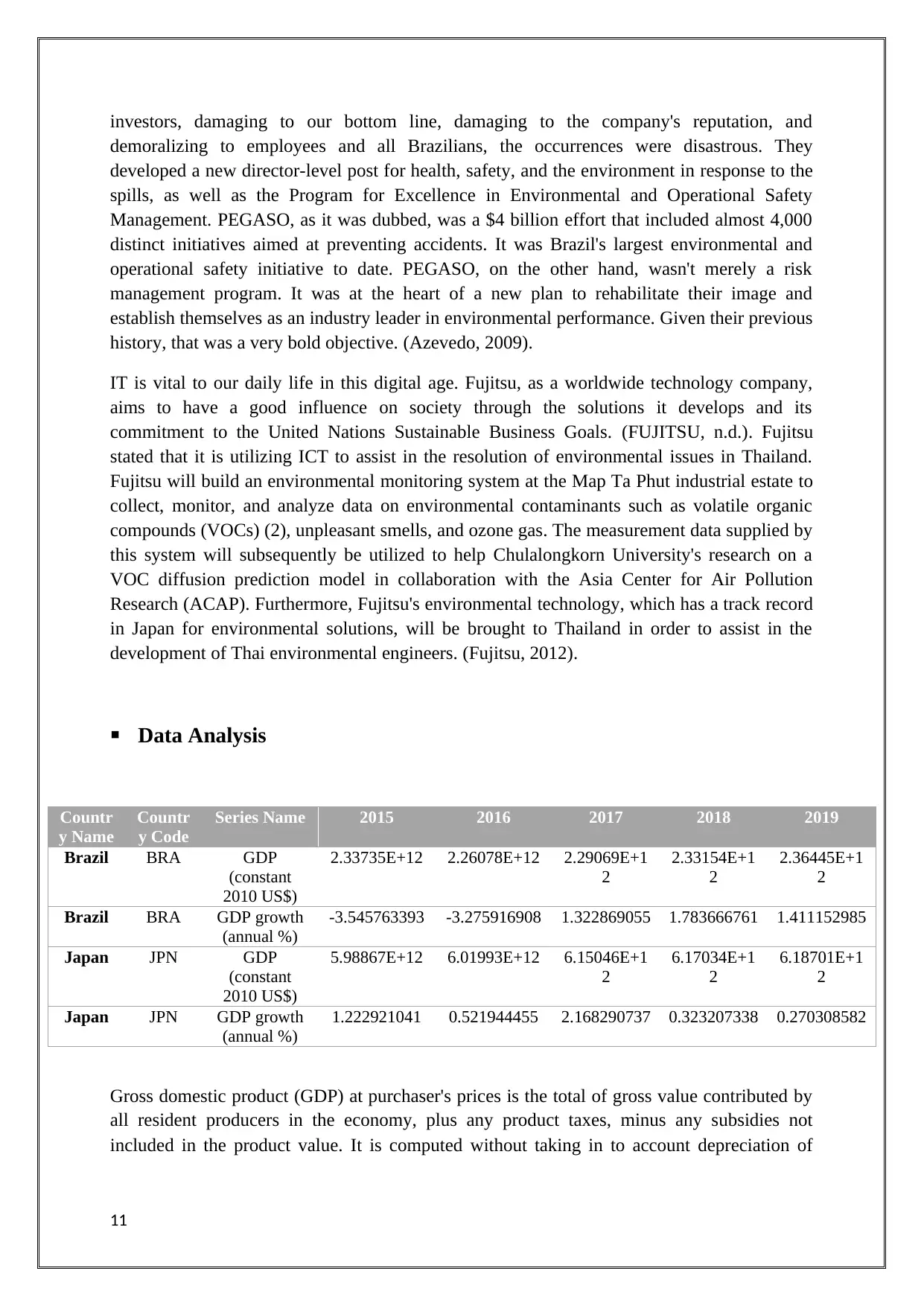
investors, damaging to our bottom line, damaging to the company's reputation, and
demoralizing to employees and all Brazilians, the occurrences were disastrous. They
developed a new director-level post for health, safety, and the environment in response to the
spills, as well as the Program for Excellence in Environmental and Operational Safety
Management. PEGASO, as it was dubbed, was a $4 billion effort that included almost 4,000
distinct initiatives aimed at preventing accidents. It was Brazil's largest environmental and
operational safety initiative to date. PEGASO, on the other hand, wasn't merely a risk
management program. It was at the heart of a new plan to rehabilitate their image and
establish themselves as an industry leader in environmental performance. Given their previous
history, that was a very bold objective. (Azevedo, 2009).
IT is vital to our daily life in this digital age. Fujitsu, as a worldwide technology company,
aims to have a good influence on society through the solutions it develops and its
commitment to the United Nations Sustainable Business Goals. (FUJITSU, n.d.). Fujitsu
stated that it is utilizing ICT to assist in the resolution of environmental issues in Thailand.
Fujitsu will build an environmental monitoring system at the Map Ta Phut industrial estate to
collect, monitor, and analyze data on environmental contaminants such as volatile organic
compounds (VOCs) (2), unpleasant smells, and ozone gas. The measurement data supplied by
this system will subsequently be utilized to help Chulalongkorn University's research on a
VOC diffusion prediction model in collaboration with the Asia Center for Air Pollution
Research (ACAP). Furthermore, Fujitsu's environmental technology, which has a track record
in Japan for environmental solutions, will be brought to Thailand in order to assist in the
development of Thai environmental engineers. (Fujitsu, 2012).
Data Analysis
Countr
y Name
Countr
y Code
Series Name 2015 2016 2017 2018 2019
Brazil BRA GDP
(constant
2010 US$)
2.33735E+12 2.26078E+12 2.29069E+1
2
2.33154E+1
2
2.36445E+1
2
Brazil BRA GDP growth
(annual %)
-3.545763393 -3.275916908 1.322869055 1.783666761 1.411152985
Japan JPN GDP
(constant
2010 US$)
5.98867E+12 6.01993E+12 6.15046E+1
2
6.17034E+1
2
6.18701E+1
2
Japan JPN GDP growth
(annual %)
1.222921041 0.521944455 2.168290737 0.323207338 0.270308582
Gross domestic product (GDP) at purchaser's prices is the total of gross value contributed by
all resident producers in the economy, plus any product taxes, minus any subsidies not
included in the product value. It is computed without taking in to account depreciation of
11
demoralizing to employees and all Brazilians, the occurrences were disastrous. They
developed a new director-level post for health, safety, and the environment in response to the
spills, as well as the Program for Excellence in Environmental and Operational Safety
Management. PEGASO, as it was dubbed, was a $4 billion effort that included almost 4,000
distinct initiatives aimed at preventing accidents. It was Brazil's largest environmental and
operational safety initiative to date. PEGASO, on the other hand, wasn't merely a risk
management program. It was at the heart of a new plan to rehabilitate their image and
establish themselves as an industry leader in environmental performance. Given their previous
history, that was a very bold objective. (Azevedo, 2009).
IT is vital to our daily life in this digital age. Fujitsu, as a worldwide technology company,
aims to have a good influence on society through the solutions it develops and its
commitment to the United Nations Sustainable Business Goals. (FUJITSU, n.d.). Fujitsu
stated that it is utilizing ICT to assist in the resolution of environmental issues in Thailand.
Fujitsu will build an environmental monitoring system at the Map Ta Phut industrial estate to
collect, monitor, and analyze data on environmental contaminants such as volatile organic
compounds (VOCs) (2), unpleasant smells, and ozone gas. The measurement data supplied by
this system will subsequently be utilized to help Chulalongkorn University's research on a
VOC diffusion prediction model in collaboration with the Asia Center for Air Pollution
Research (ACAP). Furthermore, Fujitsu's environmental technology, which has a track record
in Japan for environmental solutions, will be brought to Thailand in order to assist in the
development of Thai environmental engineers. (Fujitsu, 2012).
Data Analysis
Countr
y Name
Countr
y Code
Series Name 2015 2016 2017 2018 2019
Brazil BRA GDP
(constant
2010 US$)
2.33735E+12 2.26078E+12 2.29069E+1
2
2.33154E+1
2
2.36445E+1
2
Brazil BRA GDP growth
(annual %)
-3.545763393 -3.275916908 1.322869055 1.783666761 1.411152985
Japan JPN GDP
(constant
2010 US$)
5.98867E+12 6.01993E+12 6.15046E+1
2
6.17034E+1
2
6.18701E+1
2
Japan JPN GDP growth
(annual %)
1.222921041 0.521944455 2.168290737 0.323207338 0.270308582
Gross domestic product (GDP) at purchaser's prices is the total of gross value contributed by
all resident producers in the economy, plus any product taxes, minus any subsidies not
included in the product value. It is computed without taking in to account depreciation of
11
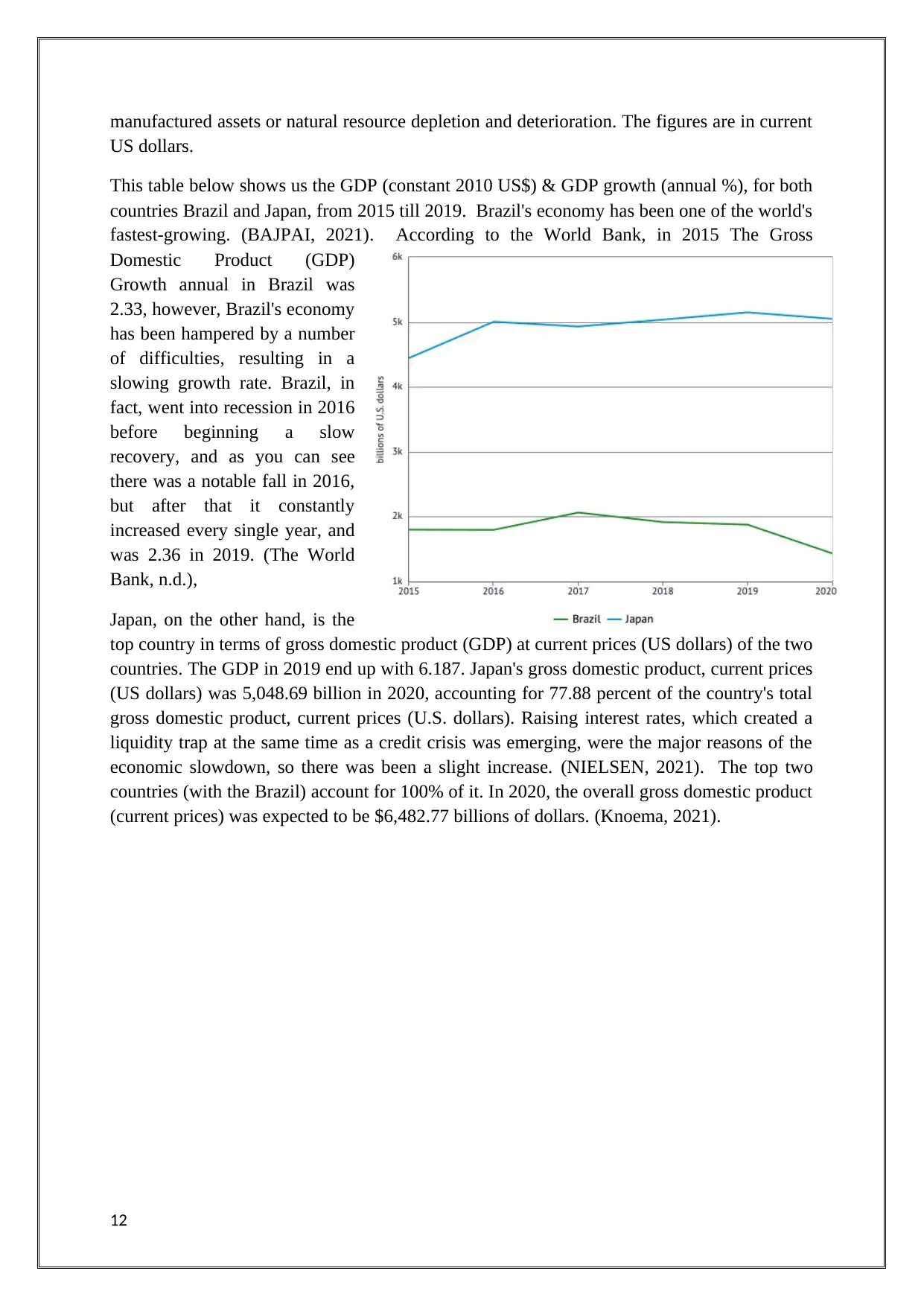
manufactured assets or natural resource depletion and deterioration. The figures are in current
US dollars.
This table below shows us the GDP (constant 2010 US$) & GDP growth (annual %), for both
countries Brazil and Japan, from 2015 till 2019. Brazil's economy has been one of the world's
fastest-growing. (BAJPAI, 2021). According to the World Bank, in 2015 The Gross
Domestic Product (GDP)
Growth annual in Brazil was
2.33, however, Brazil's economy
has been hampered by a number
of difficulties, resulting in a
slowing growth rate. Brazil, in
fact, went into recession in 2016
before beginning a slow
recovery, and as you can see
there was a notable fall in 2016,
but after that it constantly
increased every single year, and
was 2.36 in 2019. (The World
Bank, n.d.),
Japan, on the other hand, is the
top country in terms of gross domestic product (GDP) at current prices (US dollars) of the two
countries. The GDP in 2019 end up with 6.187. Japan's gross domestic product, current prices
(US dollars) was 5,048.69 billion in 2020, accounting for 77.88 percent of the country's total
gross domestic product, current prices (U.S. dollars). Raising interest rates, which created a
liquidity trap at the same time as a credit crisis was emerging, were the major reasons of the
economic slowdown, so there was been a slight increase. (NIELSEN, 2021). The top two
countries (with the Brazil) account for 100% of it. In 2020, the overall gross domestic product
(current prices) was expected to be $6,482.77 billions of dollars. (Knoema, 2021).
12
US dollars.
This table below shows us the GDP (constant 2010 US$) & GDP growth (annual %), for both
countries Brazil and Japan, from 2015 till 2019. Brazil's economy has been one of the world's
fastest-growing. (BAJPAI, 2021). According to the World Bank, in 2015 The Gross
Domestic Product (GDP)
Growth annual in Brazil was
2.33, however, Brazil's economy
has been hampered by a number
of difficulties, resulting in a
slowing growth rate. Brazil, in
fact, went into recession in 2016
before beginning a slow
recovery, and as you can see
there was a notable fall in 2016,
but after that it constantly
increased every single year, and
was 2.36 in 2019. (The World
Bank, n.d.),
Japan, on the other hand, is the
top country in terms of gross domestic product (GDP) at current prices (US dollars) of the two
countries. The GDP in 2019 end up with 6.187. Japan's gross domestic product, current prices
(US dollars) was 5,048.69 billion in 2020, accounting for 77.88 percent of the country's total
gross domestic product, current prices (U.S. dollars). Raising interest rates, which created a
liquidity trap at the same time as a credit crisis was emerging, were the major reasons of the
economic slowdown, so there was been a slight increase. (NIELSEN, 2021). The top two
countries (with the Brazil) account for 100% of it. In 2020, the overall gross domestic product
(current prices) was expected to be $6,482.77 billions of dollars. (Knoema, 2021).
12
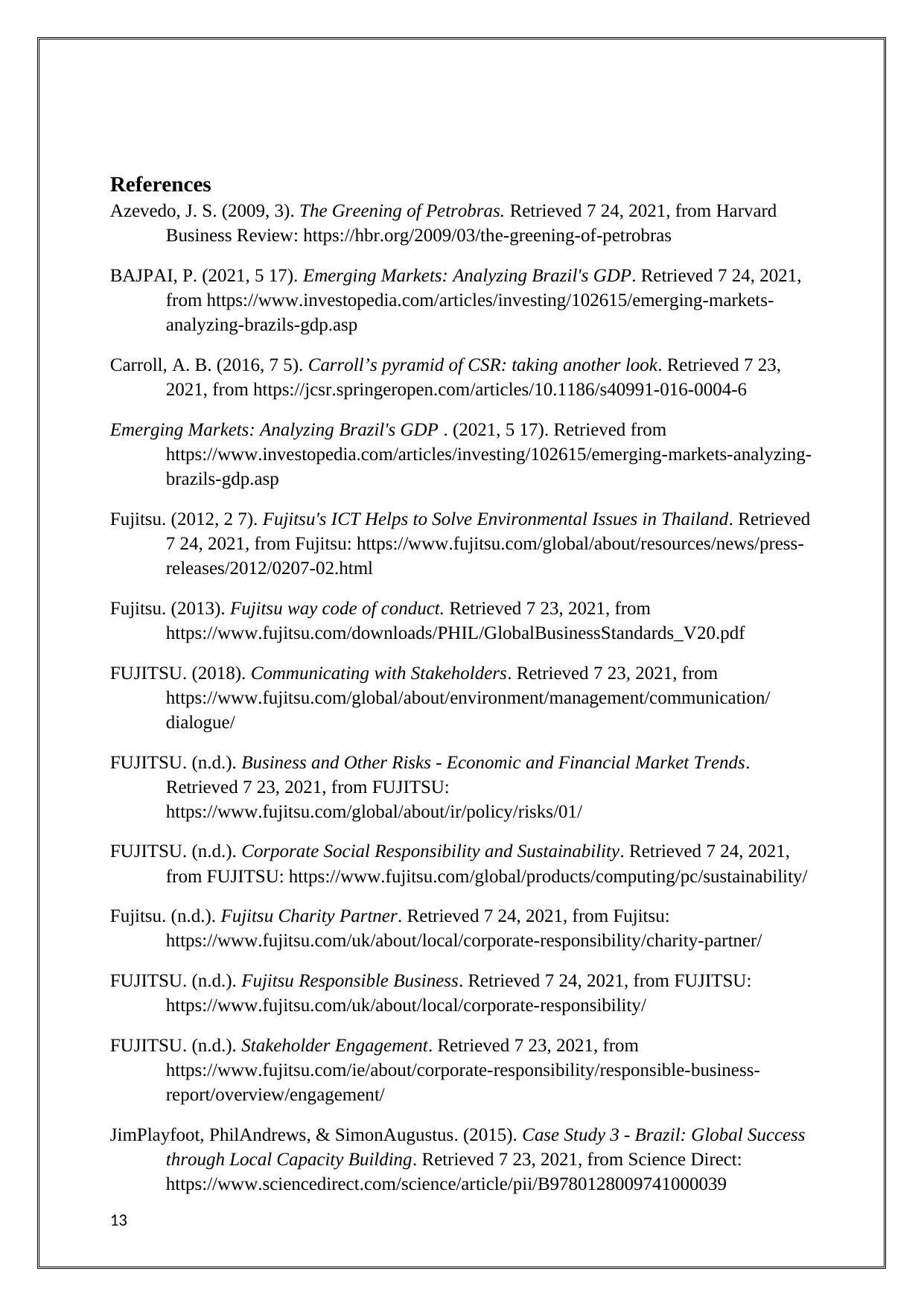
References
Azevedo, J. S. (2009, 3). The Greening of Petrobras. Retrieved 7 24, 2021, from Harvard
Business Review: https://hbr.org/2009/03/the-greening-of-petrobras
BAJPAI, P. (2021, 5 17). Emerging Markets: Analyzing Brazil's GDP. Retrieved 7 24, 2021,
from https://www.investopedia.com/articles/investing/102615/emerging-markets-
analyzing-brazils-gdp.asp
Carroll, A. B. (2016, 7 5). Carroll’s pyramid of CSR: taking another look. Retrieved 7 23,
2021, from https://jcsr.springeropen.com/articles/10.1186/s40991-016-0004-6
Emerging Markets: Analyzing Brazil's GDP . (2021, 5 17). Retrieved from
https://www.investopedia.com/articles/investing/102615/emerging-markets-analyzing-
brazils-gdp.asp
Fujitsu. (2012, 2 7). Fujitsu's ICT Helps to Solve Environmental Issues in Thailand. Retrieved
7 24, 2021, from Fujitsu: https://www.fujitsu.com/global/about/resources/news/press-
releases/2012/0207-02.html
Fujitsu. (2013). Fujitsu way code of conduct. Retrieved 7 23, 2021, from
https://www.fujitsu.com/downloads/PHIL/GlobalBusinessStandards_V20.pdf
FUJITSU. (2018). Communicating with Stakeholders. Retrieved 7 23, 2021, from
https://www.fujitsu.com/global/about/environment/management/communication/
dialogue/
FUJITSU. (n.d.). Business and Other Risks - Economic and Financial Market Trends.
Retrieved 7 23, 2021, from FUJITSU:
https://www.fujitsu.com/global/about/ir/policy/risks/01/
FUJITSU. (n.d.). Corporate Social Responsibility and Sustainability. Retrieved 7 24, 2021,
from FUJITSU: https://www.fujitsu.com/global/products/computing/pc/sustainability/
Fujitsu. (n.d.). Fujitsu Charity Partner. Retrieved 7 24, 2021, from Fujitsu:
https://www.fujitsu.com/uk/about/local/corporate-responsibility/charity-partner/
FUJITSU. (n.d.). Fujitsu Responsible Business. Retrieved 7 24, 2021, from FUJITSU:
https://www.fujitsu.com/uk/about/local/corporate-responsibility/
FUJITSU. (n.d.). Stakeholder Engagement. Retrieved 7 23, 2021, from
https://www.fujitsu.com/ie/about/corporate-responsibility/responsible-business-
report/overview/engagement/
JimPlayfoot, PhilAndrews, & SimonAugustus. (2015). Case Study 3 - Brazil: Global Success
through Local Capacity Building. Retrieved 7 23, 2021, from Science Direct:
https://www.sciencedirect.com/science/article/pii/B9780128009741000039
13
Azevedo, J. S. (2009, 3). The Greening of Petrobras. Retrieved 7 24, 2021, from Harvard
Business Review: https://hbr.org/2009/03/the-greening-of-petrobras
BAJPAI, P. (2021, 5 17). Emerging Markets: Analyzing Brazil's GDP. Retrieved 7 24, 2021,
from https://www.investopedia.com/articles/investing/102615/emerging-markets-
analyzing-brazils-gdp.asp
Carroll, A. B. (2016, 7 5). Carroll’s pyramid of CSR: taking another look. Retrieved 7 23,
2021, from https://jcsr.springeropen.com/articles/10.1186/s40991-016-0004-6
Emerging Markets: Analyzing Brazil's GDP . (2021, 5 17). Retrieved from
https://www.investopedia.com/articles/investing/102615/emerging-markets-analyzing-
brazils-gdp.asp
Fujitsu. (2012, 2 7). Fujitsu's ICT Helps to Solve Environmental Issues in Thailand. Retrieved
7 24, 2021, from Fujitsu: https://www.fujitsu.com/global/about/resources/news/press-
releases/2012/0207-02.html
Fujitsu. (2013). Fujitsu way code of conduct. Retrieved 7 23, 2021, from
https://www.fujitsu.com/downloads/PHIL/GlobalBusinessStandards_V20.pdf
FUJITSU. (2018). Communicating with Stakeholders. Retrieved 7 23, 2021, from
https://www.fujitsu.com/global/about/environment/management/communication/
dialogue/
FUJITSU. (n.d.). Business and Other Risks - Economic and Financial Market Trends.
Retrieved 7 23, 2021, from FUJITSU:
https://www.fujitsu.com/global/about/ir/policy/risks/01/
FUJITSU. (n.d.). Corporate Social Responsibility and Sustainability. Retrieved 7 24, 2021,
from FUJITSU: https://www.fujitsu.com/global/products/computing/pc/sustainability/
Fujitsu. (n.d.). Fujitsu Charity Partner. Retrieved 7 24, 2021, from Fujitsu:
https://www.fujitsu.com/uk/about/local/corporate-responsibility/charity-partner/
FUJITSU. (n.d.). Fujitsu Responsible Business. Retrieved 7 24, 2021, from FUJITSU:
https://www.fujitsu.com/uk/about/local/corporate-responsibility/
FUJITSU. (n.d.). Stakeholder Engagement. Retrieved 7 23, 2021, from
https://www.fujitsu.com/ie/about/corporate-responsibility/responsible-business-
report/overview/engagement/
JimPlayfoot, PhilAndrews, & SimonAugustus. (2015). Case Study 3 - Brazil: Global Success
through Local Capacity Building. Retrieved 7 23, 2021, from Science Direct:
https://www.sciencedirect.com/science/article/pii/B9780128009741000039
13
Paraphrase This Document
Need a fresh take? Get an instant paraphrase of this document with our AI Paraphraser
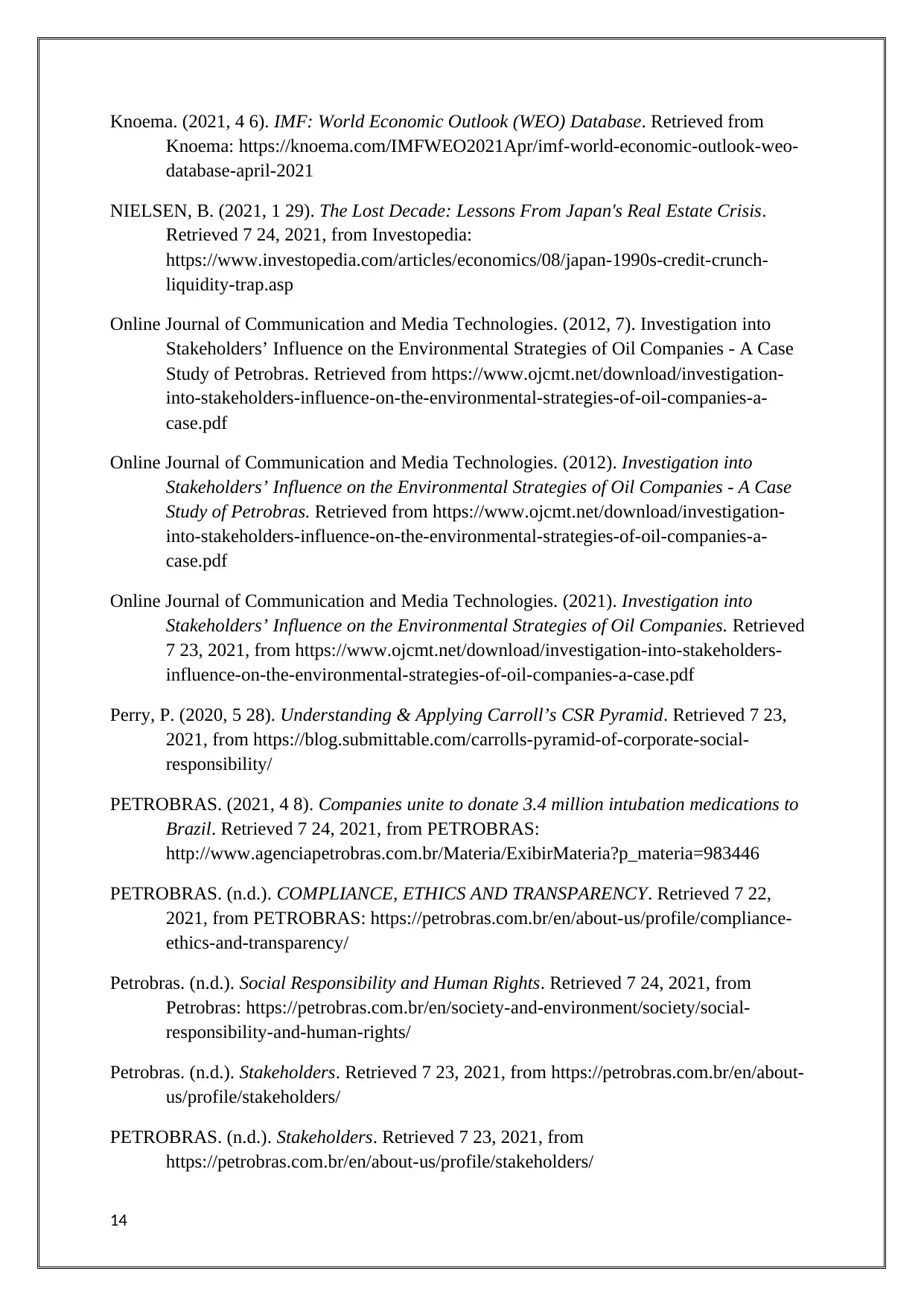
Knoema. (2021, 4 6). IMF: World Economic Outlook (WEO) Database. Retrieved from
Knoema: https://knoema.com/IMFWEO2021Apr/imf-world-economic-outlook-weo-
database-april-2021
NIELSEN, B. (2021, 1 29). The Lost Decade: Lessons From Japan's Real Estate Crisis.
Retrieved 7 24, 2021, from Investopedia:
https://www.investopedia.com/articles/economics/08/japan-1990s-credit-crunch-
liquidity-trap.asp
Online Journal of Communication and Media Technologies. (2012, 7). Investigation into
Stakeholders’ Influence on the Environmental Strategies of Oil Companies - A Case
Study of Petrobras. Retrieved from https://www.ojcmt.net/download/investigation-
into-stakeholders-influence-on-the-environmental-strategies-of-oil-companies-a-
case.pdf
Online Journal of Communication and Media Technologies. (2012). Investigation into
Stakeholders’ Influence on the Environmental Strategies of Oil Companies - A Case
Study of Petrobras. Retrieved from https://www.ojcmt.net/download/investigation-
into-stakeholders-influence-on-the-environmental-strategies-of-oil-companies-a-
case.pdf
Online Journal of Communication and Media Technologies. (2021). Investigation into
Stakeholders’ Influence on the Environmental Strategies of Oil Companies. Retrieved
7 23, 2021, from https://www.ojcmt.net/download/investigation-into-stakeholders-
influence-on-the-environmental-strategies-of-oil-companies-a-case.pdf
Perry, P. (2020, 5 28). Understanding & Applying Carroll’s CSR Pyramid. Retrieved 7 23,
2021, from https://blog.submittable.com/carrolls-pyramid-of-corporate-social-
responsibility/
PETROBRAS. (2021, 4 8). Companies unite to donate 3.4 million intubation medications to
Brazil. Retrieved 7 24, 2021, from PETROBRAS:
http://www.agenciapetrobras.com.br/Materia/ExibirMateria?p_materia=983446
PETROBRAS. (n.d.). COMPLIANCE, ETHICS AND TRANSPARENCY. Retrieved 7 22,
2021, from PETROBRAS: https://petrobras.com.br/en/about-us/profile/compliance-
ethics-and-transparency/
Petrobras. (n.d.). Social Responsibility and Human Rights. Retrieved 7 24, 2021, from
Petrobras: https://petrobras.com.br/en/society-and-environment/society/social-
responsibility-and-human-rights/
Petrobras. (n.d.). Stakeholders. Retrieved 7 23, 2021, from https://petrobras.com.br/en/about-
us/profile/stakeholders/
PETROBRAS. (n.d.). Stakeholders. Retrieved 7 23, 2021, from
https://petrobras.com.br/en/about-us/profile/stakeholders/
14
Knoema: https://knoema.com/IMFWEO2021Apr/imf-world-economic-outlook-weo-
database-april-2021
NIELSEN, B. (2021, 1 29). The Lost Decade: Lessons From Japan's Real Estate Crisis.
Retrieved 7 24, 2021, from Investopedia:
https://www.investopedia.com/articles/economics/08/japan-1990s-credit-crunch-
liquidity-trap.asp
Online Journal of Communication and Media Technologies. (2012, 7). Investigation into
Stakeholders’ Influence on the Environmental Strategies of Oil Companies - A Case
Study of Petrobras. Retrieved from https://www.ojcmt.net/download/investigation-
into-stakeholders-influence-on-the-environmental-strategies-of-oil-companies-a-
case.pdf
Online Journal of Communication and Media Technologies. (2012). Investigation into
Stakeholders’ Influence on the Environmental Strategies of Oil Companies - A Case
Study of Petrobras. Retrieved from https://www.ojcmt.net/download/investigation-
into-stakeholders-influence-on-the-environmental-strategies-of-oil-companies-a-
case.pdf
Online Journal of Communication and Media Technologies. (2021). Investigation into
Stakeholders’ Influence on the Environmental Strategies of Oil Companies. Retrieved
7 23, 2021, from https://www.ojcmt.net/download/investigation-into-stakeholders-
influence-on-the-environmental-strategies-of-oil-companies-a-case.pdf
Perry, P. (2020, 5 28). Understanding & Applying Carroll’s CSR Pyramid. Retrieved 7 23,
2021, from https://blog.submittable.com/carrolls-pyramid-of-corporate-social-
responsibility/
PETROBRAS. (2021, 4 8). Companies unite to donate 3.4 million intubation medications to
Brazil. Retrieved 7 24, 2021, from PETROBRAS:
http://www.agenciapetrobras.com.br/Materia/ExibirMateria?p_materia=983446
PETROBRAS. (n.d.). COMPLIANCE, ETHICS AND TRANSPARENCY. Retrieved 7 22,
2021, from PETROBRAS: https://petrobras.com.br/en/about-us/profile/compliance-
ethics-and-transparency/
Petrobras. (n.d.). Social Responsibility and Human Rights. Retrieved 7 24, 2021, from
Petrobras: https://petrobras.com.br/en/society-and-environment/society/social-
responsibility-and-human-rights/
Petrobras. (n.d.). Stakeholders. Retrieved 7 23, 2021, from https://petrobras.com.br/en/about-
us/profile/stakeholders/
PETROBRAS. (n.d.). Stakeholders. Retrieved 7 23, 2021, from
https://petrobras.com.br/en/about-us/profile/stakeholders/
14
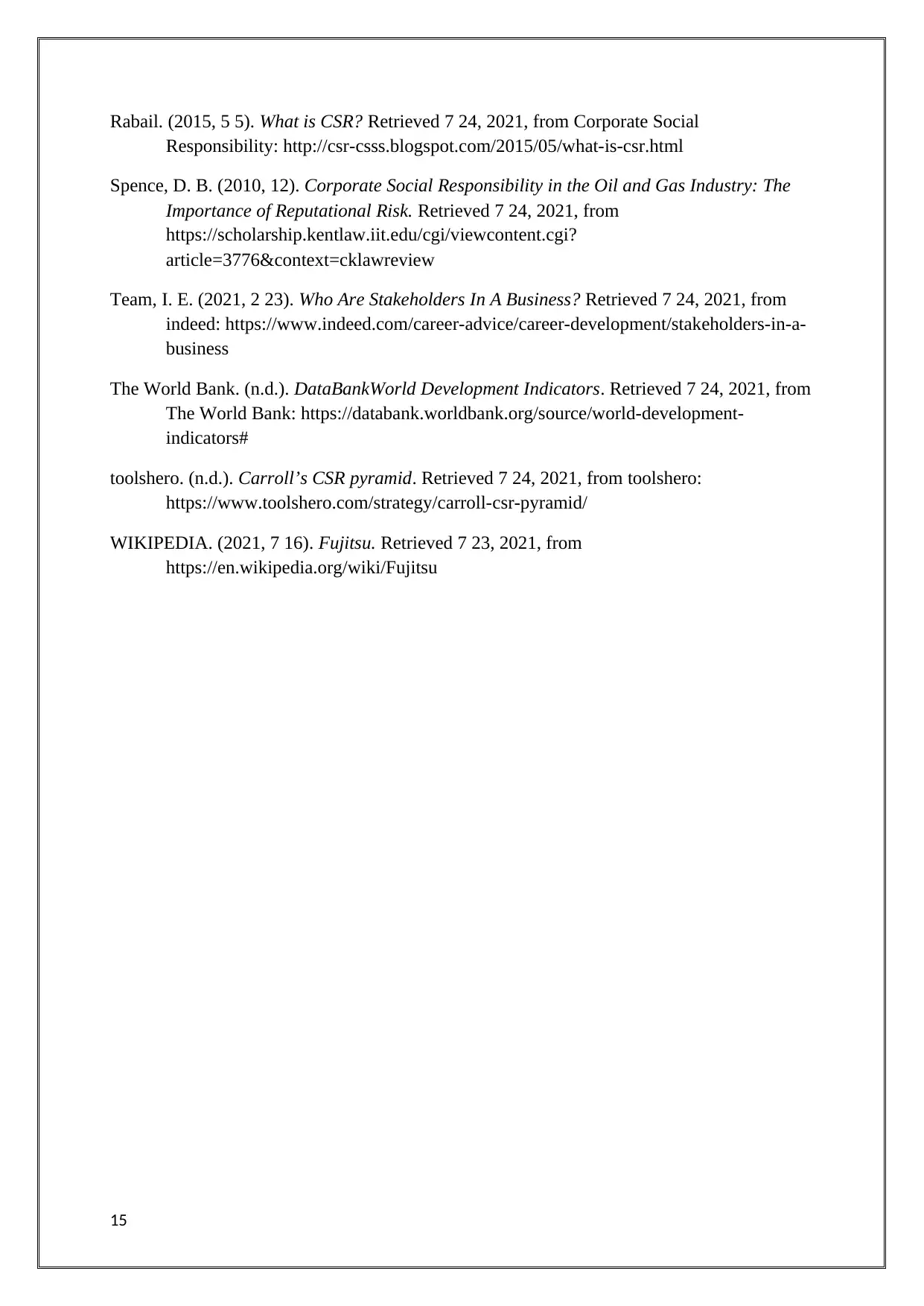
Rabail. (2015, 5 5). What is CSR? Retrieved 7 24, 2021, from Corporate Social
Responsibility: http://csr-csss.blogspot.com/2015/05/what-is-csr.html
Spence, D. B. (2010, 12). Corporate Social Responsibility in the Oil and Gas Industry: The
Importance of Reputational Risk. Retrieved 7 24, 2021, from
https://scholarship.kentlaw.iit.edu/cgi/viewcontent.cgi?
article=3776&context=cklawreview
Team, I. E. (2021, 2 23). Who Are Stakeholders In A Business? Retrieved 7 24, 2021, from
indeed: https://www.indeed.com/career-advice/career-development/stakeholders-in-a-
business
The World Bank. (n.d.). DataBankWorld Development Indicators. Retrieved 7 24, 2021, from
The World Bank: https://databank.worldbank.org/source/world-development-
indicators#
toolshero. (n.d.). Carroll’s CSR pyramid. Retrieved 7 24, 2021, from toolshero:
https://www.toolshero.com/strategy/carroll-csr-pyramid/
WIKIPEDIA. (2021, 7 16). Fujitsu. Retrieved 7 23, 2021, from
https://en.wikipedia.org/wiki/Fujitsu
15
Responsibility: http://csr-csss.blogspot.com/2015/05/what-is-csr.html
Spence, D. B. (2010, 12). Corporate Social Responsibility in the Oil and Gas Industry: The
Importance of Reputational Risk. Retrieved 7 24, 2021, from
https://scholarship.kentlaw.iit.edu/cgi/viewcontent.cgi?
article=3776&context=cklawreview
Team, I. E. (2021, 2 23). Who Are Stakeholders In A Business? Retrieved 7 24, 2021, from
indeed: https://www.indeed.com/career-advice/career-development/stakeholders-in-a-
business
The World Bank. (n.d.). DataBankWorld Development Indicators. Retrieved 7 24, 2021, from
The World Bank: https://databank.worldbank.org/source/world-development-
indicators#
toolshero. (n.d.). Carroll’s CSR pyramid. Retrieved 7 24, 2021, from toolshero:
https://www.toolshero.com/strategy/carroll-csr-pyramid/
WIKIPEDIA. (2021, 7 16). Fujitsu. Retrieved 7 23, 2021, from
https://en.wikipedia.org/wiki/Fujitsu
15
1 out of 15
Your All-in-One AI-Powered Toolkit for Academic Success.
+13062052269
info@desklib.com
Available 24*7 on WhatsApp / Email
![[object Object]](/_next/static/media/star-bottom.7253800d.svg)
Unlock your academic potential
© 2024 | Zucol Services PVT LTD | All rights reserved.


